#End of Showdown is a good example of this
Explore tagged Tumblr posts
Text
Yeah, I'm fairly sure that it was just Alan not caring to be 100% consistent and taking "shortcuts". Which, in all fairness, he was completely in his right to do, no shame on him, I think I'd prolly do the same. Especially since AvA 2 & 3 were before he decided to lean into the "series" as his career, so he was making these for the fun of it at the time. He's allowed to be a little lazy lmao
I think it'd be interesting to see how current day Alan and his team would handle animating the ball and chain, if they did a backstory episode/flashback about Chosen akin to Victim's. There's definitely a higher bar of quality in the current style/animation process, but you do still occasionally get those little "cheaty" moments, but they're much harder to spot if your not going frame by frame bc they happen so fast.
Regardless, I hadn't realized it was mostly on the left leg; I'd thought that it was pretty much even between the two. Looking back, however, I can see how my eyes might've been misidentifying the direction/position of his body in some instances.
This one, for example:

I thought the shackled leg was behind the other one, and bc the bend of the arm makes it clear he's facing upwards, that would make it appear as his right. But it could just as easily be in front of the other leg, thus being the left.
Although, in my defense, there are some moments around this instance where it does look like it's on the right side:


The shackled leg looks like it's positioned behind the other while Chosen is facing to the left and upwards respectively. This would make the shackled leg his right one.

This is another that stood out to me as being potentially right leg, as it appears to me that Chosen's body is facing left rather than towards the background.

And then there's this one, where Chosen IS facing towards the background (bc he's climbing on the text) with his left arm and upper back overlapping his right arm. Following that positioning, it makes the most sense for the shackled leg to be his right one.
Honestly, I'm starting to think that Alan was just picking the leg that was closest to the ball most of the time, prolly cuz it was the easiest to animate the chain for.
Anyway, attempting to figure out where Chosen is looking or how he's standing is admittedly a bit difficult due to the early/old wonky animation. Which, as a sidenote, is something that current AvA has improved upon massively, perhaps even perfected. That's actually one of the ingenious things of Orange's head design; because it's always meant to be oriented a certain way, alterations to that orientation/positioning help our brains identify where he's looking or facing; which then helps with the rest of his body's positioning. With the solid-heads, however, it's the opposite: we use the body as the indicator of how they're positioned. It's really freaking neat!
That's likely a reason why each of the Hollowheads now have a canon head design as well; It's much easier to notice which way Chosen is looking in his current style bc his head is always the same shape/design. The limb style has also been firmly established, with a standardized thickness and length, which also helps in determining which limb is which.
It's just really cool to see how something as simple as "conveying which way a stick figure is positioned" has evolved over the past ~20 years, into a skill that Alan and his team have mastered beautifully.
Anyway, I think the general consensus is that the shackle was on his left leg, despite teenaged Alan's probable "Eh, it doesn't really matter that much" attitude towards it when he was making it lmao
[Which, second sidenote: Goes well with the fact that Chosen, while shown to be ambidextrous, primarily uses his right hand as his dominant. The chain being on his left leg was probably slightly more comfortable for him than if it'd been on the same side as his dominant hand. And that's neat too!]
Context: In the animation of AvA 2 and 3, the shackle actually switches legs fairly frequently, making it impossible for there to be a “correct” (or at least consistent) answer. I am curious if there is a fandom consensus or preference on the matter.
Feel free to reblog to explain your thoughts if you want to.
#If you want an example of the current team being cheaty in regards to sidedness: Chosen's head in The Box is a really sneaky one#I hadn't even noticed it until i went looking to double check which side the thicker bit of his head was on#It's supposed to be upper right if he's facing the screen#But in the early scenes of the Box when Agent suppresses his fire and lasers it's on the LEFT side of his head/face#It's really freakin sneaky and the animation is so good you don't even notice it#While in other instances you DO notice the orientation of his head; bc your eyes use it as the determiner of where he's looking#End of Showdown is a good example of this#Absolutely amazing. See what I mean about them perfecting the art of stick figure body language and animation?
57 notes
·
View notes
Text
Guess who's on TV!
(Well, iPlayer until the 15th, that's when it airs on BBC One)
Hope Street episode 3.11, let's go!

First of all, I'd say they did me dirty with this picture, but my university ID was exponentially worse.
Onto the spoilers!
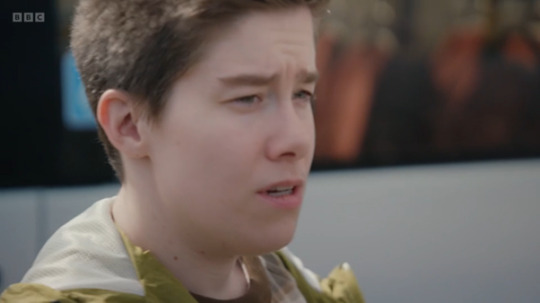
Our boy Matthew has arrived in Port Devine, looking a little concerned.
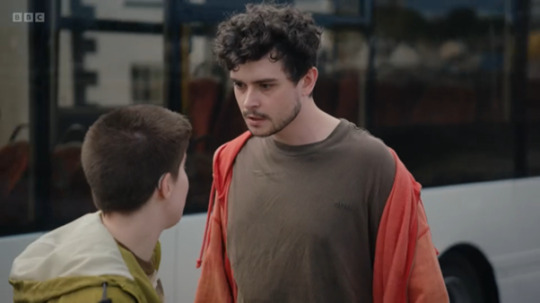
For good reason when he's suddenly confronted by this lad, Dara.
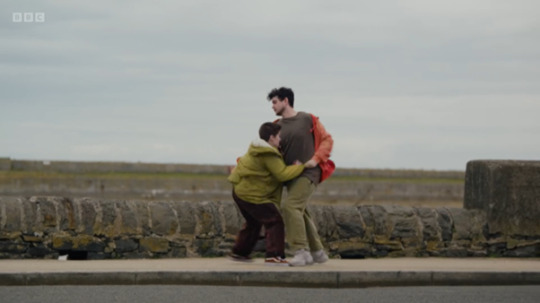
Ah, a fight which Matthew escapes by slipping out of his coat. (Pretty sure this is the take where we ripped it practically in two...)
Dara's questioned, he claims he's never met Matthew in his life. Hmm.
Police do some investigating (and some character stuff) before Dara makes his way to Matthew's mother (Louise)'s house to have a wee showdown.

They both in a gang and Matthew's stolen a gun. Dara needs to get it back...
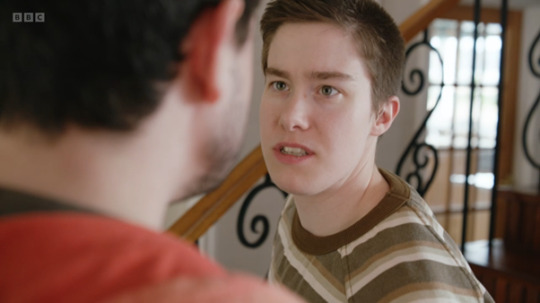
Matthew's nay having it. "This is my way out. If they want the gun back, they have to let me go."
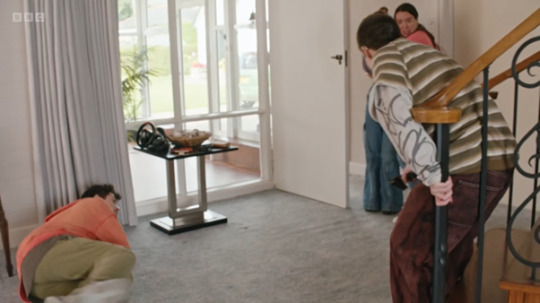
Another fight. The gun goes off! (Poor Pete and I were convinced after take one to put some padding on. My arm looks bulky because I'm strapped up with squishy stuff and allergic to plasters so it has to be in a sock)
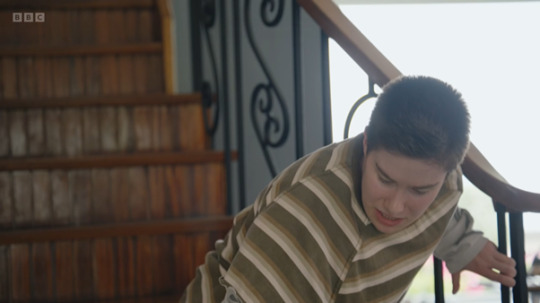
Thank fuck no one was hurt. Dara gets the hell out of dodge -
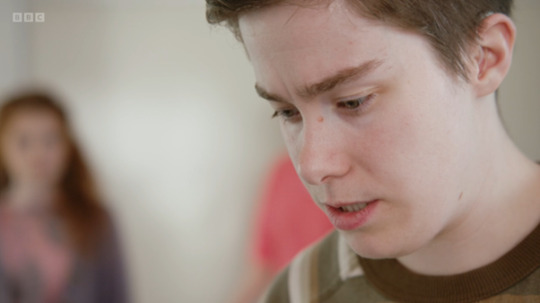
Leaving Matthew to contemplate his mortality. And other people's, but mostly his own.
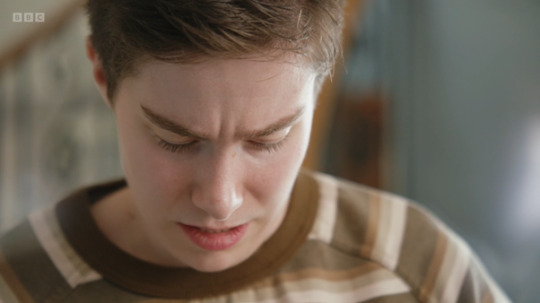
"Oh fuck, my bosses are gonna find me and murder me, oh shit. I'm far too young and pretty to die!"
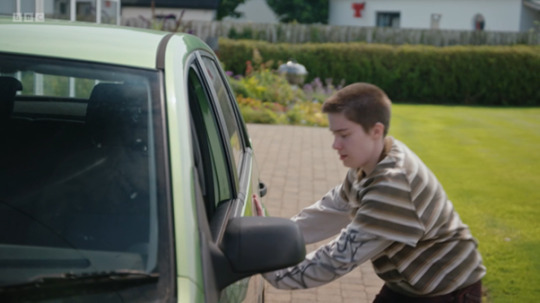
Time for Matthew and Louise to follow Dara's example and get the fuck out of here.
The police are now on the Halbridges' trail, but they discover the phone tracking them and leave it in a field.
Meanwhile, Dara's been arrested for drug dealing. He refuses to talk, clearly nervous.

Ah, what's this on Dara's phone? So Matthew and Dara have been in a relationship for over a year now.
(The poor intimacy coordinator having to walk me through my just about second kiss in my entire life. And the third. And the fourth. And the fifth... Pete is a very sweet person. Made it all funny.) ("Relax your hand, Bodh. Just relax it. Open - open your fingers, just let me position your hand.")
They're both working for the same gang. Matthew was given the gun to hold onto by their bosses' and freaked out, running away with the weapon. His plan was to trade his freedom for the gun, but Dara was sent to get it back for the Brazier Brothers, notorious drug runners and gang leaders.

These guys.
Unfortunately, now Dara's had to tell the Brazier Brothers that Matthew is refusing. They're going to kill Matthew and then Dara. Oh no.
But Dara has an idea where they might be hiding.
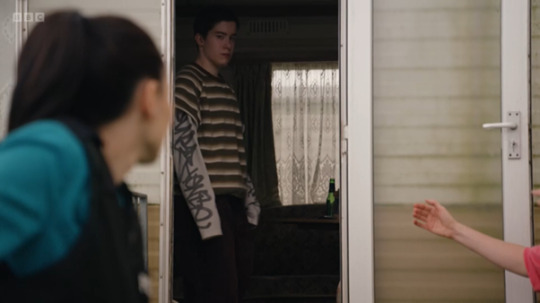
At the caravan there's a standoff between the police and Halbridges. But when the Braizer Brothers are arrested, they're convinced to come out.
(Side note, my favourite picture of me, ever.)
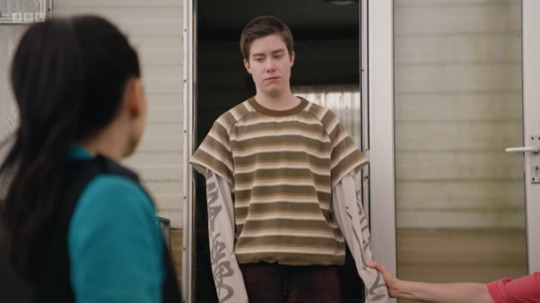
Oh no, the Halbridges are going to jail and Matthew's regretting his life choices.
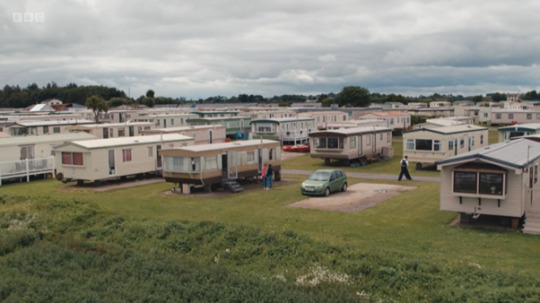
Matthew walked off to his new life inside a jail cell.
The end.
(This is where Niall Wright accidently sublexed my shoulder. To be fair to the man, I'd never mentioned it and he took his finger sliding in-between bone like a champ)
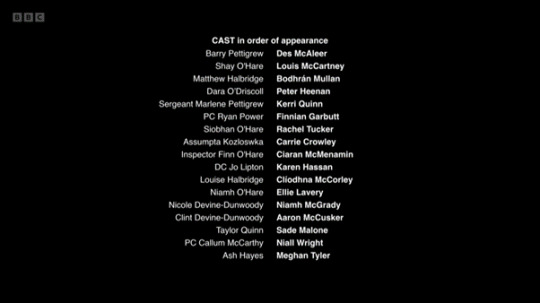
Look, it's me!! I was on TV! Bit sad they cut pretty much all the uses of SSE (weren't allowed BSL because we still had to speak the lines), but I got to be queer and Deaf so that's pretty nice.
2K notes
·
View notes
Text
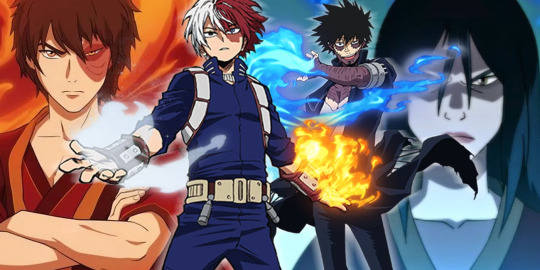
DOOMED SIBLINGS: THE TODOROKIS VS. THE FIRE NATION ROYAL FAMILY
I received an ask in my inbox about how Zuko doesn't owe Azula any forgiveness. Truthfully I wasn't even going to respond because this isn't an avatar blog, but then I watched this video.
Not only do I disagree with the basically everything in this video, but I am going to make the argument that both Zuko' and Azula's arcs are both incomplete with the way the show left the two of them in the final showdown.
In order to make my argument I'm going to compare Azula and Zuko's relationship in avatar to Shoto and Toya's relationship in My Hero Academia and use the latter as a more positive example.
Unnecessary Redemption Arcs
The common fandom opinion I want to argue against is this idea that Azula's ending is a perfect tragedy, and therefore doesn't need to be expanded upon. There's also a sentiment that redeeming Azula would somehow ruin the impact of this perfect tragedy.
I'm about to argue against both of these points.
Azula's arc doesn't work as a tragedy.
Because of this her arc is unsatisfying and unfinished.
I'm going to address the first bullet point but before that let me add another disclaimer. The reason why I think Azula's arc isn't an effectively written tragedy isn't because I like Azula.
Before we even get into the My Hero Academia comparison let me bring up something completely different. I do like Azula, but I like Terra Markov from Teen Titans a lot more and I would not change a thing about her tragic end.
AZULA'S ARC IS NOT A WELL-WRITTEN TRAGEDY
Terra in the comics is what a lot of people accuse Azula of being. She is stated in the text and by her creators to be an unfeeling sociopath. She was also never intended by her creators to be redeemed.
[About Terra] The very first time we see her, she’s trying to blow up the Statue of Liberty. It’s just that all the fans assumed because we went out of our way to make her cute — but not too cute, with the buck teeth and everything — everyone would assume that she was gonna become good by the end and that was never the case. First thing, we made a promise that day that we would never renege on our view that she’d never become good. It’s sometimes hard to do that with characters you like. You want them to become good or something like that. But we never liked the character enough—because we knew what we were doing with her—we never allowed ourselves to fall for the character. Because that’s bad. That’s bad storytelling. You’re doing what you want as a fan at that particular point, not as the creators. T
Now let me clarify, both creators of New Teen Titans say some nasty things about Terra and don't recognize her sexual abuse, but here's the thing. You don't have to read a story 100% the way the author intended, sometimes the story says one thing and the text says something different.
I am going to use Judas Contract as an example of a story where the character from the start was never intended to be redeemed and why that's a positive in this case.
Terra is a teenage girl, the bastard daughter of the king of Markovia and a random American woman who presumably has had no stable home her entire life because she's working as a mercenary at fifteen. She teams up with a man that is in his mid fifties and even starts a sexual relationship with him (this is statutory rape she cannot consent) and Deathstroke uses her to infiltrate the Teen Titans and learn as much as possible.
Terra is sent to live with the team and spy on them for several months. The whole time she only ever engages with them in a fake spunky persona, and never shows her real cutthroat self. She leads Beast Boy on in a fake romance to make him trust her and secure her place on the team. The way you'd usually expect this arc to go is that Terra would grow fond of the team and be torn in her loyalties.
Yeah, that never happens.
Terra loathes the Titans. In fact she's developed a superiority complex about her meta human abilities and she doesn't understand why anyone would use their powers to help others. She despises the concept of superheroes in general, and because of that never bonds with any of the Titans. Her feelings never change from start to finish, because her creators intentionally wrote her as a character that can't be redeemed.
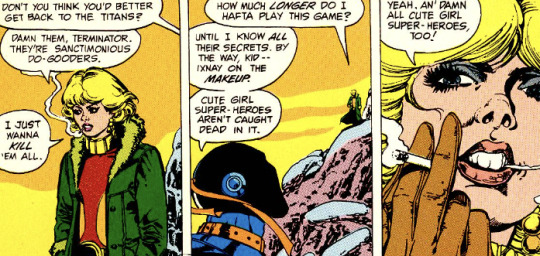
Terra is written to be a psychopath, but even with that intention in mind there are scene that shows a greater range of emotions. She has what could amount to a trauma flashback when Beast Boy too aggressively flirts with her and tries to kiss her and she reacts violently, trying to bury him under the earth.
Let's go ahead and interpret Terra as what is used as the fictional definition of a "sociopath" that is someone who feels no bonds with other people, someone with shallow emotions and someone devoid of guilt. Even if we interpret her that way, her story is still meant to be read as a tragedy.
Terra succeeds in her mission of infiltrating the Titans. Slade captures most of them, and the only remaining member Dick Grayson goes missing. Dick Grayson then unites with Slade's son Jericho, and the two of them team up in order to rescue the rest of their friends.
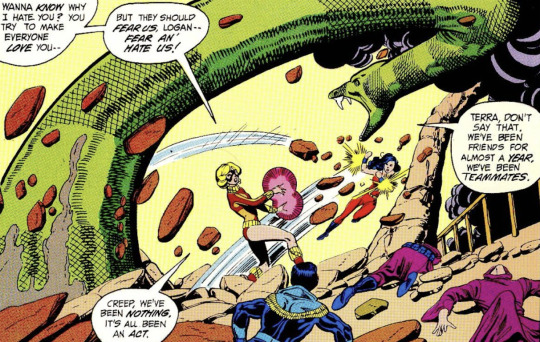
Even after all she's done the Titans try to make pleas to Terra during the final battle, which she not only rejects but responds to with violence. Which only confirms what I said above, Terra never grew to love them, she never regretted her actions, she only ever engaged with them with lies.
(Terra always lies, Terra always lies, Terra always lies).
Terra is declared by Raven to be devoid of emotions: "Her thinking is unlike ours. She feels no true love or hate. Her soul is corrupt. What she does is done without remorse."
Even after Raven declares this, however she still pleads with Terra to stop because she's going to hurt herself. Terra feels Slade betrayed her because he favored his son Jericho over her, so she decides to take both Slade and the Titans down. As the Titans fight her she begins to mentally fall apart ignoring their appeals to her and lashing out at everything around her. Eventually she makes one last attempt to everything around her, but the Titans escape and she only manages to bury herself.
At no point in the fight do the Titans give up on trying to reach her even as she's loudly screaming how much she hates them. Even after she's buried and it looks like she's dead, Gar and Donna both try desperately to dig her up on the slim hope she's still alive. When they find the body they even give her a funeral afterwards, even though they all think that Terra was beyond redemption.
Even the prose narration that accompanies her death is incredibly melancholy and bemoans her fate, at the same time as it calls her a outright sociopath.
There's no reasoning with her now. However slim, whatever sanity Tara Markov possessed is gone. Now there is only primal hatred! Hatred born, nurtured, and fanned. Hatred that festers and grows without care, without feeling, without plan. her pursed lips part and the sounds which echoes force are garbled and inhuman. Hot, boiling blood gushes wildly from the earth's open wounds, its skin fractures and cracks, and if a world could cry, it surely would. Her name is Tara Markov and she is little more than sxiteen years old, and due to the fault of no one but herself she is insane. No one taught her to hate, yet she hates without cause, without reason. No one taught her to destroy, yet she destroys with glee, with relish. Don't look for reasons which do not exist, plainly Tara Markov is what she is, and she has taken a great power and made it as corrupt as she. Hers was the power over the earth itself she could have brought life to deserts, hat to the frozen tundra, food to sraving millions. She could have damned raging rivers, and tunneled water to packed lands dry and dead. her powers were limited only by the mind which controlled them. A mind which sought not hope, not love, not life, but death.
If you go with the text that she is just a sociopath beyond redemption who hates and hates and hates for no reason, the narrative still mourns her because a sixteen year old with her whole life ahead of being consumed by hatred and then dying because of it is in fact sad.
If you read into the subtext then you can argue that the events of the story, contradicts what the narration is telling us. Terra is being sexually groomed and groomed as a child soldier by a man who is much older than her, even if she thinks he's a partner he clearly has all power in the relationship.
If you think about it that way then Terra is the ultimate bad victim. She doesn't cry and call for help as a victim of sexual abuse, instead she tries to claim power for herself, she manipulates, and she destroys any chance she had for a genuine relationship because she only sees all relationships as transactions she can gain or lose from.
Even if you only go with the first interpretation, the narrative still remains tragic because the Titans themselves did not want to give up on her, they did not want to watch this sixteen-year-old girl destroy herself. They never stop reaching out for her and it doesn't work, because there was no way out for Terra but death.
Here's the thing I don't think Terra's status as a sexual victim automatically means an ending where she dies is offensive. It reflects a reality that victims like Terra often go unseen because they don't present their victimhood in palatable ways, and by the time anyone notices it's far too late. Sometimes tragedies are meant to reflect a reality where many people do not get saved.
There's two reasons that Judas Contract works as a tragic story. Number one the creators planned Terra's ending right from the beginning. Which meant they never gave her any moment where she shows that she's redeemable. There's no genuine bond between her and the titans, no wrestling with the guilt of her actions, nothing.
Number two, Judas Contract is Terra's story from beginning to end. It begins with her betrayal of the Titans, and ends with her death. The death is also brought upon herself by her fatal flaw her hatred, which is what makes her the protagonist of a tragedy. Tragedies are stories where heroes are undone by their flaws. Terra also goes out on her own terms. She buries herself underneath her own rocks. Her death is a direct consequence of her inability to let go of her hatred. Terra's not fridged for anybody else's arc, she retains her agency until the exact moment of her death.
To simplify into bullet points, Judas Contract works because:
The creators thought out what they wanted to do with Terra.
Judas contract is Terra's story.
Now, getting to the part where we actually talk about Avatar, and I start complaining about that awful, awful video.
AZULA'S ARC IS NOT WELL THOUGHT OUT
I just went on a long tangent on how Terra, a character written to have no redeemable qualities can still be tragic. How the creators marked her as clearly doomed from the start, and how she brought about her end on herself, how there no redemption for Terra. How this girl had no real chance, and how regardless of the fact Terra is a lil baby sociopath her fall is still tragic because of how well structured the tragedy is surrounding her.
It's awful to kill off a sixteen year old victim of sexual abuse, but the ending just fits because Terra represents a certain type of bad, unsympathetic victim who doesn't get saved.
Azula's arc isn't as well structured. The ending does not fit. I'm going to start by refuting some points in the awful, awful video I did not like.
"Maybe it's okay if Azula's story ends where it does in the series we would separate how we would treat a real 14-year-old girl from a villain in a series, ad that's why any redemption arc isn't need i a story after all. A character needs of deserves a redemption arc when it becomes the most meaningful way to explore their character and place in the story, but a character deserving redemption usually comes before the story really needing it, and I don't think Azula's done anything to deserve it yet. They've got to exhibit some willingness and action to change..."
So the main reason I'm using Terra as my first example is because Terra is the kind of character that Hello Future Me is describing. Terra was written with the specific intention she'd never experience a change of heart, all of the friendships she makes with the Titans are fake, she very loudly experiences no remorse, or even self-reflection over what she is. Terra's pretty proudly a monster and she never experiences any kind of self-doubt or regret over what she's become.
I can disprove right away Hello Future Me's blanket statement (with no actual cited examples, just trust him guys) that Azula never did anything to hint she may deserve redemption. That suggests Azula is an entirely selfish character who uses, manipulates and thinks she's right and worst of all is comfortable being the way she is, and therefore incapable of doing the self-reflection necessary for change.
Azula does show the capacity to do selfless actions several times in the narrative, and even consider the feelings of others. There's the apology scene with Ty Lee and the way she interacts with her friends in general with the Beach where when she's not fighting in a war or trying to complete a mission for her father Azula 1) interacts with her friends in a normal way and 2) seems to express a desire to experience normal relationships not the hierarchical ones she's experienced all of her life.
However, that's not the example I'm going to use as her save the cat moment. I generally intend to interpret that as a sign that even though she treats Mai and Ty Lee as subordinates and that power she holds over them eventually leads to them leaving her, their friendship isn't just Azula abusing them and lording her authority over their heads 24/7.
No, Azula's save the cat moments all revolve around Zuko. Which is funny, because the entire fandom seems to regard Azula as Zuko's evil little sister who exists to do nothing but torment her.
The first and biggest is Azula deciding to bring Zuko home in Ba Sing Se, and telling a lie to her father that he was the one to slay the avatar.
Ozai: I am proud of you, Prince Zuko. I am proud because you and your sister conquered Ba Sing Se. I am proud because when your loyalty was tested by your treacherous uncle, you did the right thing and captured the traitor. And I am proudest of all of your most legendary accomplishment: you slayed the Avatar.
Zuko: [Shocked.] What did you hear? Ozai: Azula told me everything. She said she was amazed and impressed at your power and ferocity at the moment of truth. [Inspired partly by this post]
Now the show seems to regard this action as Azula being an evil temptress who is there to tempt Zuko back to her side with everything he thinks he ever wanted.
That's only if you regard it from Zuko's perspective.
Think for a moment from Azula's perspective. Number one, Azula is someone thoroughly indoctrinated into Fire Nation propaganda who measures her self-worth based on 1) military achievement and 2) her father's approval and assessment of her talents. In Azula's own logic (wrongheaded as it is) she's helping Zuko. She's bringing him back home with his place in the line of succession restored and his father's approval.
Azula doesn't benefit from this gesture at all, in fact if her father discovers the lie she has as much to lose as Zuko does.
Now Zuko insinuates that Azula only brought Zuko along and told her father that he was the one who killed the avatar so she could let him take the fall if the avatar turned out to be alive.
However, if you look at the actual order of events that doesn't make sense. Azula saw the avatar die, she didn't know about the spirit water, and therefore had no way of knowing Aang could come back. In fact, it's Zuko who 1) knew about the spirit water and 2) decides to keep the spirit water and the fact the avatar might have survived a secret that is throwing Azula under the bus. After all she has as much to lose as he did and instead of sharing that information with her he decides to keep it all to himself.
Now Azula does imply that if the avatar were to turn out to be alive all of Zuko's glory would dry up, but this is only after Zuko 1) throws accusations at her and 2) makes it's pretty clear he's lying to her putting her on the defensive.
This is also a scenario where Azula doesn't have much to gain by bringing Zuko back, if you look at it from her perspective. If Azula just lets Zuko rot in a ba sing se prison, then her claim to the throne is secure. With Zuko back he's restored in the line of succession. She also, when making the decision to invite Zuko to her side probably didn't need him for her plan to succeed.
There is a dramatic moment of Zuko choosing to side with Azula over Katara which turns the tide in Azula's favor, but Azula can't see into the future and therefore wouldn't be able to predict that happening. If you look at it from Azula's perspective she 1) successfully infiltrated the city, 2) already had the Dai Lee in her pocket. She likely already thought she had the city secure at this point so her decision to extend a hand out to Zuko is therefore likely motivated by selflessness instead of self-interest.
That's important because usually when Azula usually only gives her help to others if it also benefits her in some way. Azula might genuinely see her recruiting Mai and Ty Lee to her side as a member of the royal family extending her favor and giving them status and security in their positions but it has the underlying motivation of 1) she keeps them in a position to beneath her and therefore in her complete control.
Azula will interact with Mai and Ty Lee like friends on the surface, as long she maintains control over them, but if they do anything to something that displeases her she'll do anything to regain her control.
Mai: I thought you ran off and joined the circus. You said it was your calling. Ty Lee: Well, Azula called harder.
This is set up in Azula's very first interaction with Ty Lee. Azula greets her like an old friends, Ty Lee even seems happy to see her, but the second Ty Lee tries to say no to her Azula goes to extreme lengths to "persuade her". Azula's friendship with Mai and Ty Lee is an abusive friendship because there is a power differential and even if Azula feels genuine affection for them both it's clear they're not allowed to say no. Mai and Ty Lee are put into positions where it's in their best interest to please her, and live in fear of the consequences if they don't do just that.
Here's the thing, I'm not arguing that Azula didn't deserve any consequences for her actions. I'm arguing that the setup doesn't match her eventual ending. Azula is set up to have Mai and Ty Lee leave her from the very first scene that Azula interacts with Ty Lee. It's satisfying because the set up matches the pay off.
It's also tragic because it's Azula continuing the chain of abuse. The video isn't entirely wrong (which is why they came to the wrong conclusion frustrating).
Azula's fall is about how differenting parenting styles can a child. Ozai's affection is exchanged for being useful. Something Azula would go on to repeat with her friends, whereas Iroh's affection is something freely given with patience for imperfections and failures, something Zuko goes then on to repeat.
It's like... there it is it's so close. Here's the thing, Azula is set up for a tragic falling out with Mai and Ty Lee (and one she deserves) but the set up is different with Zuko. Azula's save the cat moment revolves around Zuko, and her genuine attempt to bring her brother home.
Yes, the first time Azula interacts with Zuko in season 2, she tries to take him home by force. However, by the ending of the season Azula's perspective on the matter has obviously changed because she begins by trying to bring him back as a prisoner, and by the end of the season invites him back as an equal.
There's no moment in Season 3 where Azula treats Zuko the way she does Mai and Ty Lee (unless Zuko provokes it first and puts her on the defensive) in fact most of her interactions are either them interacting normally (such as when Azula goes to find Zuko at their old beach house because she knows he'll be there and advises he leave instead of dwelling on their depressing memories) or Azula deliberately trying to look out for Zuko such as when she advises him not to go visiting with Uncle because it'll make others suspicious.
On the other hand, Zuko never at any point looks out for his sister the way Azula is demonstrated looking out for him. He doesn't say, try to tell her where he's going on the Day of Black Sun, or try to convince her the fire nation is wrong. There's a scene in the later part of Season 3 where Zuko is watching Azula fall to her death while sitting on a flying bison and not only sits there and does nothing about it, but sounds disappointed when she doesn't hit the ground and become an Azula Pancake.
That's pretty much the opposite of a save the cat moment. It's a "let the cat fall to their death" kind of moment.
Yes they were enemies at that point, but Zuko's the one who's supposed to learn that affection is something freely given with patience for imperfections and failures, something Zuko goes then on to repeat.
How exactly is he doing that in this scene?
The thing is... this setup doesn't have to be bad. Of course Zuko has trouble has trouble empathizing with Azula, he doesn't even think about sending a letter to Mai, Zuko's shown at this point to be like a healing abuse victim who's understandably focused on himself.
This in fact could be excellent set up with step 1) learning what genuine love and forgiveness is and 2) demonstrating those two things by applying it to others.
However, that's not where we got. We got Zuko watching his sister have a complete emotional breakdown, crying and screaming while chained to a grate and looking somewhat sad.
And once again to bring Terra into this, Terra is what Stay at Home and parts of fandom argue that Azula is. Terra screams at the top of her lungs how much she hates the Titans, how much she was always lying to them, and the Titans STILL try to reach Terra with words, try to de-escalate the conflict, when she's about to bring the rocks falling down on herself warn her she's going to hurt herself, and then when she's buried under rubble try to dig her out begging for her too still be alive.
Terra who's intentionally created by her writers to be as hatable as possible, is shown more compassion by the heroes in her ending than Zuko ever does to Azula. They also give Terra multiple opportunities to change until literally the very last minute, which Zuko doesn't do either.
What's set up is Azula has this save the cat moment with her brother, that Zuko is pretty much the only person she doesn't treat like a subordinate in the story (because she just like Zuko has a craving for familial love she tries to earn from her father). However, her ending with Zuko just taking her down doesn't fit that setup.
Azula's ending only fits if you consider her arc entirely from Zuko's perspective, which is the underlying issue. Azula's not the protagonist of her own tragedy, she's a plot object that's used to benefit Zuko's arc.
Azula's is written to have a downfall, the same way that Zuko loses everything at the ending of season 1 b/c of his inability to give up on the obsessive search for the avatar (and his father's love with it). Azula is written to be left by Mai and Ty Lee (this is the strongest point of writing when it comes to her since it comes from the beginning).
However, she's not written to be left completely alone and insane with the only empathy being shown is that her brother looks kinda sorta sad. That's only good if you view her as an object to further Zuko's arc, because isn't the ultimate culmination of Zuko beating his sister who has always been ahead of him at life? Azula needs to torn down completely without even some small glimpse of a hope of recovery so Zuko can be built up even moreor at least the writers of avatar seem to think so.
However, even Azula just existing for Zuko's growth and character development doesn't have to necessarily be a bad thing. This is where we get to MHA, which does the tragic siblings and the final Ag Ni Kai about 1000 times better with Shoto and Dabi.
THE GOOD
The comparisons between Shoto and Dabi to Zuko and Azula are made pretty often by the fandom. Shoto has a scar, Dabi has blue flames. Shoto has an arc about healing and learning what it means to be a hero, Dabi's arc is about self-destruction.
Dabi's not the center of his own story, he exists to foil Shoto and help Shoto reach the endpoint of his character development however that's not necessarily a bad thing. These are both two pairs of tragic siblings, the main difference is that MHA doesn't feel the need to tear down one sibling in order to build up the other. In fact, the final step to Shoto's arc is HELPING Dabi, not PUTTING HIM DOWN.
Not only that but the decision to help Dabi is a decision that Shoto makes on his own, and him going against the tide of a society that has already given up on Dabi and would much rather have Shoto shoot Dabi like a mad dog. Which makes the decision to do so even more powerful and emblematic of Shoto's growth.
Now you could say that Shoto and Zuko are too different to compare their arcs, Zuko has a redemption arc, and Shoto has what most people would probably term a healing arc. Shoto starts out the series as a hero.
However, this is what annoys me about the redemption arc debate. A redemption arc is really just a normal character arc. However, calling it redemption drags things like morality and forgiveness into the debate. if you take remove the discussion about moral philosophy both Zuko and Shoto have character arcs where they start the story defined entirely by their home situations and their father's abuse (hence why they have big obvious scars on their face), recover from their trauma, and go on to find an identity outside of their father and form healthy non-abusive connections with others.
In fact I'd see the theme of both arcs are the same, to literally find balance within themselves. Shoto is divided quite literally into right and left sides, fire and ice, and even seems to view himself as half of his father and half of his mother. Zuko is someone who's permanently marked and dishonored by the burn scar on his face. He suffers from an internal imbalance as well. Iroh says that Zuko is the descendant of both Roku and Sozin and therefore both pathways are open to him (but wouldn't that apply to Azula too). Zuko says to his father that the fire nation has destroyed the balance to the world and he's going to leave to assist the avatar in order to fix it.
Shoto's balance isn't just about fixing his internal trauma though, it's also about finding a balance between his family which has defined his entire life up until this point, and his desire to become his own hero not the hero his father groomed him into.
It's why the culmination of his arc is Shoto reaching out to save his family member Toya, because it's the ultimate balance in wanting to heal his family, and also the kind of hero he wants to be, someone who saves and brings peace to others instead of just violently putting down villains. He can bring peace to his family and become his own hero in one action.
However, let's go back to the beginning of Shoto's arc, because saving Toya as an endpoint to his arc is set up pretty early on.
Shoto's arc begins with Deku, a stranger breaking down Shoto's walls as an outsider in order to allow him to look past his own trauma and recall for the first time what he wanted outside of his resentment towards his father. This sets up the idea early on for Shoto that sometimes you need outside interference, help you didn't ask for, especially when you can't see outside of your own problems.
What Deku brings about ultimately is a change of perspective, Shoto's so hurt by the memory of his mother throwing boiling water in his face and everything that came after that he can't recall the memory of her telling him he could be who he wanted to be.
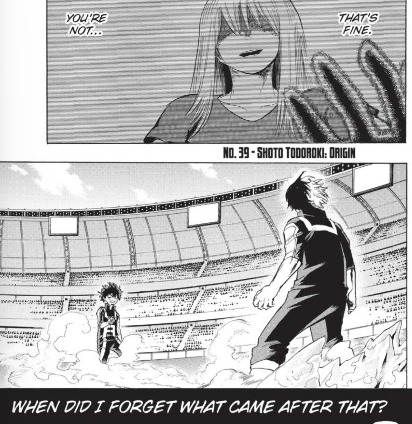
But, you want to be a hero right?
Shoto takes away two things from this arc, sometimes you need help even when you're not asking for it, and sometimes a change in respective is required in order to take the first step forward.
He goes to demonstrate these things multiple times, but here's two exaamples. The first Shoto demonstrates immediately after the tournament arc. When Iida is about to go down a dark path and commit a revenge killing on Stain. When, as a result of that IIDA is paralyzed and about to die in an alleyway, it's Shoto who both notices Midoriya and Iida are missing and shows up in the clutch. He's practicing the same thing that Deku taught him in the last arc: Giving help that's not asked for is what makes a true hero.
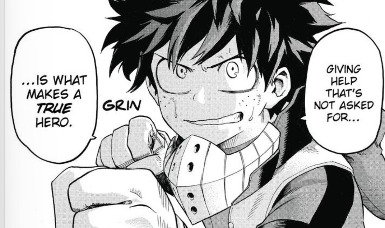
He even mentions the second idea, that a small change in perspective can be all it takes to save someone, and he wants to do for Iida hat Deku did for him. His words are the one who convinces Iida to stand back up again when he's paralyzed.
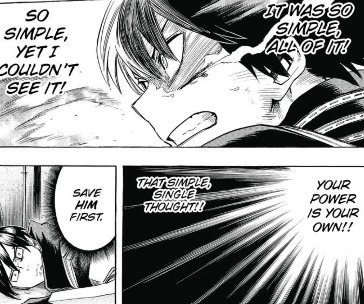
If you wanna stop this, then stand up. Because I've got one thing to say to you. Never forget who you want to become!
However Shoto's arc doesn't end here, because one of the major conflicts in MHA is that heroes don't pick and choose who to save and a true hero will give help even to those people who don't ask for it.
This is a point which further develops when Shoto's abusive father starts to show a change of heart at the end of the Pro Hero Arc. Shoto still holds his father accountable for what he did in the past, but he also acknowledges that if he had the capacity to change then so does Enji. This isn't about whether or not Enji is forgivable, this is an extension of what Shoto learned. Shoto originally believed he was controlled by the circumstances of his birth, that his fate was set in stone, but a change in perspective allows him to realize he can determine who he wants to be. So, Shoto is just applying what he's learned, Enji has the capacity to grow.
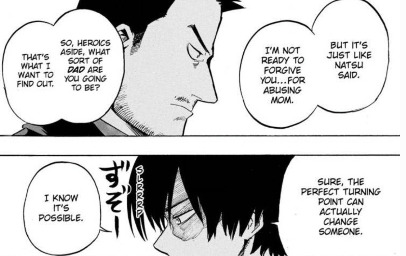
There's one final piece of setup that I want to cover before showing how these separate dies all culminate in saving Dabi. Shoto's not only someone who has to find balance between his family and his desire to be a hero.
The theme of balance is written into the quirk itself. Enji basically practiced eugenics to create Shoto as his masterpiece. He noticed a flaw in his own quirk where he could only make his flames so hot without overheating. So he arranged a quirk marriage with Rei who possessed an ice quirk to create a hybrid ice and fire quirk that he could use to cool himself off to prevent him from overheating.
Enji only ever cared about the fire half of Shoto's quirk. His ice quirk only exists for his flames to grow stronger. This is shown when Enji is trying to force Shoto to learn all of his signature moves, because he only cares about Shoto's flame quirk. Shoto was created to carry on his father's legacy, and surpass him with an even more powerful flame quirk. Part of his character development is him learning how to use his quirk in his own way.
This is a theme that continues in the class training arc where Enji is still repeating the behavior of trying to force Shoto to learn his signature moves instead of considering what he wants at all, because still Shoto only exists in Enji's mind to carry on his legacy.
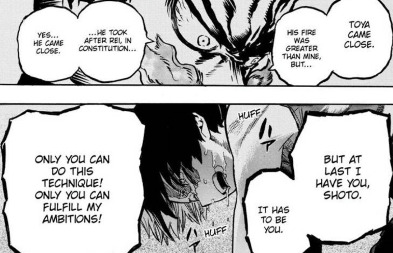
This all culminates in Toya's decision to save his brother. The first is his action in choosing to identify with his brother. If Shoto believes in his own capacity to change, and even his father's, then why would he deny Toya that same chance to change?
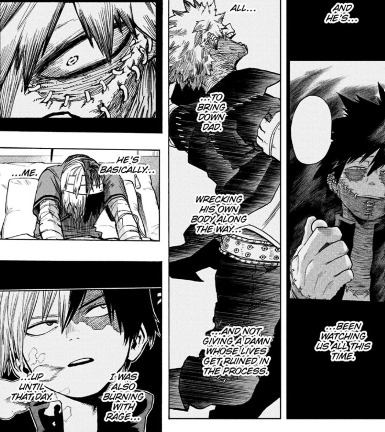
The foiling between Shoto and Toya isn't supposed to reduce the two of them to "Shoto is the good one, and he's the bad one", but instead Shoto and Toya were both in a point where they were consumed by hatred and couldn't see any other path in life. Therefore if Shoto was able to change because someone gave him help when he didn't ask for it, then Toya not only has the capacity to change - but in order for Shoto to stick to his stated beliefs that the smallest of things can bring about a change in people he has to be the one to give his brother that chance to change.
It's not about whether Dabi is worthy or not, it's about the themes in Shoto's arc finally being paid off.
Shoto's identifying with Toya, and even parts where he tells Bakugo he'll make Toya sit down and make Toya tell him his favorite food indicate that from the beginning Shoto's intention was to find a way to stop Toya without killing him (which is what several of the adult heroes were encouraging him to do).
@stillness-in-green does a more succinct summary of this plan.
Just me?
Because, like, Shouto had a plan. He spent the time between the two war arcs specifically developing a brand-new combat technique that he planned to use to shut down Dabi's combat advantage without killing him. He convinced his dad not to change the plan like Endeavor was hesitantly sounding him out about[1]; he went out and talked and asked questions, and even if they weren't the right words every single time, he did his best and he did it with intention. If Dabi proves to be dead, it won't be because of anything Shouto did to him; it'll be because Dabi himself chose to stand back up, take a warp gate across the country, pick a fight with the guy who doesn't have the power set to shut him down without unduly hurting him, and trying to replicate an Ultimate Move specifically tailored for someone with a balanced power set Dabi doesn't have. And if Dabi lives, it's still going to be because Shouto booked it across the country and used that same technique to stop him again.
Shoto's decision to save Shoto is also a continuation of his decision to help save Iida from Stain. It's not enough for Shoto to experience a change of heart about his own life, he's got to take what he learned about people's capacity to change, and the importance of connections and then put that into practice and help others the way he was helped.
However, it also further develops the theme of giving help that's not ask for from Iida because Shoto's not saving a mostly heroic kid, he's saving Toya to help break a familial cycle of abuse (because murdering the abuse victim isn't how you end the cycle of abuse... actually).
Shoto's last lines to Dabi are also a refutation of this idea of destiny that he once thought he was ruled by. It's once again, Shoto teaching someone else the lesson he learned. Toya says a warped rail can never mingle with a straight and narrow one! In other words Shoto can never understand or get along with Dabi, because Dabi will forever be defined as the failure because of the circumstances of his brith, whereas Shoto will always be the success.
His final action is a decision to break the cycle they were born into: no, we're gonna mingle whether you like it or not.
Shoto's ultimate move Phosphor is not only a move he designed far in advance to take down Dabi non-lethally, it also is a rejection of his father's teaching method. Toya says he only ever taught me how to turn up the heat. Enji only valued both Shoto and Toya for their flame quirks. Developing his own quirk and breaking away from what his father wanted, specifically in order to save his brother. It's Shoto rejecting what his father created both of them for (a successor to his quirk) and finding his own path. By using that move to take down Dabi he's not only teaching Dabi their flame exists for more than just destruction, he's also by letting Dabi live giving Dabi a chance.
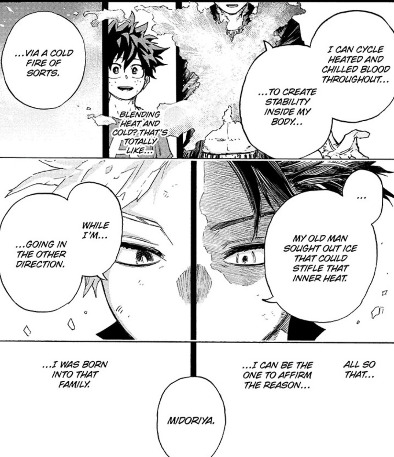
From a conversation with @class1akids
Dabi was the last push to unlock Shoto’s full power. Until then he was on the track of mastering flashfire like Endeavor planned for him (except for his own reasons) but realising the fighting Dabi with fire was gonna kill them both and also he’s simply no match fire only helped Shoto to fully take control of what his quirk is Like his quirk development goes parallel with how he faces each member of his family and finally meeting Toya is like the last piece of his puzzle to find his own full power and identity.
It's not just Shoto decides to save his brother because he's just that nice, his arc is literally incomplete without it. The act of creating phosphor a move specifically to save Dabi is both him unlocking the full power of his quirk (by balancing the fire and ice sides of his quirk) but also achieving balance between trying not to leave his family behind while at the same time becoming his own person and hero outside of his family circumstances.
Citing my conversation with class1akids again:
Toya is endangering everyone at Gunga. Endeavor has no means to stop him and when he tries to murder suicide Rei interrupts and his “hero way out” is taken. All he can do is watch helplessly as his family is about to burn to death with a bunch of strangers he tried to protect. But it would do Shoto dirty to use his heart technique to kill his family and the strangers so he comes in a clutch and I see that confrontation as the power trauma vs the power of healing in the family. With Shoto who is a true hero, they can put the fire out and save the family and strangertoo. Shoto become a balanced hero and bring relief and reassurance, Endeavor was completely helpless, and Toyas inner child got the attention he wanted, plus depending on how you read it, he may have become less suicidal.
Shoto also, and I want to point this out desires to stop his brother not to take him down but because he doesn't want him to hurt any more people. He's again finding a balance between two ideas 1) Shoto needs to stop his brother in order to stop him from creating more victims and 2) Shoto needs to find a way to stop him that's not just putting him down because Toya himself is a victim.
Shoto also, and I must point this out for the comparison between Zuko and Azula goes out of his way to engage Dabi in conversation, ask him why he didn't come home and what happened to him in the years after he died. This is especially poignant because unlike Zuko and Azula who grew up together, Shoto basically had no relationship with his brother (and the rest of his siblings really) before Toya died because Enji purposefully kept Shoto separate from all the "failures."
So yes, the act of saving Toya is more for the completion of Shoto's arc than any redemption arc for Toya but Toya's not just a plot object to move around for Shoto's arc, Toya has his own agency all throughout. In fact it's the fact that Toya resists being saved every step of the way that provides the challenge that Shoto needs to grow in order to be able to save him.
Toya's not just after revenge against his father that's the surface reason, Toya is also just blatantly suicidal. Toya's birth is marked as a failure, his death wasn't even acknowledged by his family and everything stayed the same in his absence, so he created Dabi while praying at his own shrine in order to mourn Toya. Dabi can't find any meaning in his life where he was born as a failure, so he'll use his death taking revenge against Endeavor for having been born in order to give his life meaning.
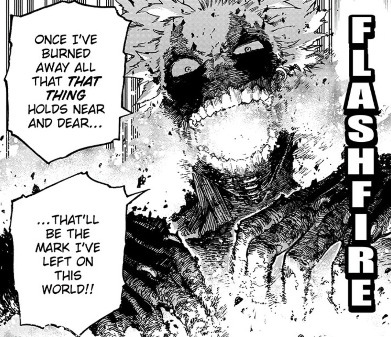
What makes Avatar look especially bad in its treatment of Azula in comparison to how MHA treats Dabi, is that Dabi is way, way less redeemable than Azula. For one Azula has clearly proven affection both her friends and her brother (and I don't think she even deserves Mai and Ty Lee's forgiveness they had every right to walk out on her and want nothing to do with her again.)
Dabi is probably the ugliest victim of the League of Villains. The rest of the league have far more moments in their bonds with each other. Toya is the outsider to the league even if there are some subtle hints to his affection (he tries to show up to save Twice, and also burns down Toga's family house to comfort her). The villains are mostly shown to be redeemable by their positive friendship with each other, and Dabi at several points denies the league's bond (he pulls a Terra and yells out loud at the top of his lungs none of the league matter to him). Unlike with Terra you can argue this is most likely Dabi trying to cover up his real feelings. However, the fact that he feels the need to hide his affection from the league shows he's purposefully distancing himself from any bonds whatsoever.
Unlike Azula who has gone out of her way to help her brother in one major way, and also shows hints in early season 3 of having that sibling bond with him Dabi just straight up wants to murk Toya. Azula also tries to murk Zuko, but that's only when Zuko leaves on the day of Black Sun (one without telling her, and two something that probably left her alone to deal with the consequences of lying to her father for his sake). Either way, Azula's behavior in early season 3 is setup for the fact that their sibling bond can be salvaged.
Dabi is way worse to Shoto in comparison. Dabi in the first part never saw Shoto as his own person, just a puppet of his father (puppets have no autonomy or personhood). His feelings towards Shoto only went so far as Shoto was someone who could kill in order to upset Enji. Dabi also doesn't particularly care for the rest of his family as well (only calling out Natsu's name when his brain is literally melting), they're either ways to hurt endeavor, or he wants to drag them in hell with him. Heck his last words after being saved is telling everyone to die and go to hell.
Dabi doesn't bother to make bonds with the league or have any lingering affection for his family because Dabi's determined to seslf destruct. He's given up on life the moment he saw that he died and nothing changed in that household, now all that's left is for him to create a meaningful death by dragging his family to hell with him.
Dabi is also even as a child made out to be an unpleasant victim. He attacks baby Shoto with his flames early on out of jealousy (even though he later admits that he was being unfair to Shoto). He makes the situation in the house worse by loudly screaming and demanding his father's attention. He screams at his mother and throws her complicity in Enji's abuse in her face.
This is in comparison to Shoto who in childhood flashbacks we are only ever seen either 1) crying, and 2) trying to comfort and protect his mother. Toya's even made out to be difficult to empathize with as a child - which like flew over half of the fandom's heads because he got accusations of somehow abusing his father and the rest of his family in that chapter at 10 years old. However, that in a way illustrates my point.
The fact that Dabi is so disliked by a certain portion of the fandom is because Horikoshi paints such an ugly portrait of Toya in the way he expresses his victimhood. It's done deliberately too, because number one Toya by resisting Shoto's attempts to save him and trying to self destruct instead retains agency as a character. He makes decisions even though they're bad self destructive ones, he's not just a prop. Number two, the fact that Toya is intentionally portrayed as such an ugly victim makes Shoto's decision to break the cycle of familial abuse by saving Toya and not leaving a single family member all the more poignant.
Toya is an uglier victim than Azula, actively trying to kill himself in a way that Azula isn't, and treats Shoto way worse than Azula ever treated Zuko and yet Azula isn't shown the sympathy or given the salvation that Toya is.
Because once again, the writers didn't think about the ending of Azula's arc or of Azula as her own character. Shoto defeating Toya is the culmination of his desire to break the cycle of abuse in his family. Zuko putting Azula down is just to make Zuko look better. It's in service of Zuko's character instead of both of their characters.
THE BAD
Avatar isn't setting up some gritty ending where the bad guys can't be stopped, they can only be killed. In fact it's pretty close in tone to MHA.
Season 3 especially is the season that really begins to hammer in on the themes that even the people on the enemy side are still human after all. The headband shows that Fire Nation children are indoctrinated into the war, but they are in the end still children. There's the story between Avatar Roku and Sozin, and once again Iroh saying that Zuko has both options becoming like Roku or becoming like Sozin available to him (but not Azula I guess). There's Zuko joining Team Avatar, even after he betrayed Katara in Ba Sing Se and should have burnt that bridge then and there. There's Zuko working to earn their trust again when no one on the team really owe it to him.
The main character of the show is a pacifist, who deliberately learns a way to stop Ozai without killing him before the final battle because he doesn't want to break the values taught to him by his culture.
If the entire theme of season 3 is redemption, healing and that the fire nation are not inherently evil then why does Zuko's sister and character foil end the last shot of the series screaming and crying with no one comforting or even attempting to sympathize with her. Why is this one character marked for tragedy in a show that is about redemption and healing and showing compassion to your enemies and very specifically not a tragedy.
Toya literally burns all of the flesh off of his body, and somehow he has a gentler ending than Azula, because at least Toya's arc ends with all the members of his family showing up to try to cool down his flames, and when he's on the ground burnt to a crisp his father finally apologizes to him. Toya is a skinless burnt chicken wing, my boy has no skin, and somehow he's better off than Azula.
I don't think the writers gave Azula such a cruel ending because they don't like her, but rather because they just didn't think about her ending outside of what it meant for Zuko. Which is why you get moments like Aang who is apparently a pacifist who doesn't want to kill the Firelord, watching his daughter fall to her death while sitting on a flying bison and doing absolutely nothing to save her. ALL LIFE IS PRECIOUS (except for Azula I guess).
It's not bad because a victim doesn't get saved, it's bad because it doesn't fit in with the rest of the story.
Not only is Zuko saving Azula a very natural conclusion to his arc, but there's far more setup for Zuko reaching out to his sister and saving her than there ever was for Toya and Shoto. Both Toya and Terra are screaming at the top of their lungs "I HATE EVERYONE, YOU SHOULD ALL JUST GO TO HELL." They're both making decisions and committing to their self destruction while Azula is a 14 year old girl having a mental breakdown.
Anyway, time to quote the bad bad video again.
"When does a villain deserve a redemption arc? When do we deserve a redemption arc? I know this is gonna hurt, but characters are not people. They are tools. They are represetations of people. They can be used to say other things. They can be symbolic representation of other ideas. Azula's story is not just about a fourteen year old defeated by her brother for the throne, Azula is Zuko's character foil, where she is ruthless and practical, Zuko is empathetic and emotional. Where Azula's a prodigy, Zuko has to work hard to earn eve a fraction of her power.
I specifically chose to cite MHA, because of how differently it decided to use Shoto and Toya's character foiling. Shoto recognizes himself in Toya, and how different their paths were in life. This is explicitly motivates him to save Toya. It's also the culmination of everything that Shoto has learned because Shoto is a hero who believes that actions speak louder than words. It's not enough for Shoto to resolve his own inner struggle, he also has to help Dabi with his because that's showing Shoto has grown rather than telling us.
I think that is where the major difference lies between Shoto and Zuko, we're told that Zuko has chosen the path of empathy and healing, that he's learned to give people love and patience like Iroh has but instead of showing that the culmination of his arc is having a fist fight with his sister in a denny's parkinglot.
Azula is Zuko's character foil, where she is ruthless and practical, Zuko is empathetic and emotional. Where Azula's a prodigy, Zuko has to work hard to earn eve a fraction of her power.
If Zuko is empathic and emotional and that is why he's gained friends while Azula is now alone after having lost her friends due to the way she treated them, then like... what a great opportunity for Zuko to SHOW that quality of empathy.
However, Zuko doesn't do anything that Shoto does in the final fight. He's not even here for Azula, Azula's just an obstacle for taking back the crown. He doesn't talk to Azula, engage her in any way, try to de-escalate and avoid the fight.
If you want to make the tragedy that Azula and Zuko have taken such different paths in life that that Zuko fighting with his sister is unavoidable you could um... at least show Zuko being sad over the prospect of fighting his sister or being reluctant in any way.
(Before you come in here with "Zuko doesn't owe Azula anything take" this isn't about whether or not Azula is a terrible sister to Zuko, this is about the story that avatar is attempting to tell. Shoto and Dabi's fight is tragic because Shoto doesn't want to fight Dabi, he wants Dabi to come home and for their family to be complete. Zuko never expresses anything like that so where does the tragedy come from?)
If it were 100% committed to a tragedy like Terra's death then I wouldn't mind. if it were 100% committed to a story of redemption like Shoto reaching out to Toya then I wouldn't mind. My issue arises from the fact they want to have their cake and eat it too.
They want to give this tragic end to Azula, and use it to illustrate how Zuko has grown as a character. However, you can't have both.
If Zuko's growth is about learning that his father's love based on achievement and 2) learning he needed to get lost in life in order to find himself then why doesn't any of Zuko's actions demonstrate this lesson Zuko has learned about love, and about how you can be your own person outside what your father expects from you.
If Zuko has grown as a character he should be able to show those actions. He does show his new understanding of love and friendship to Team Avatar, but as I said that's easy mode. That's Shoto's attempts to save Iida, it's a step in the right direction. It's also not really Zuko demonstrating a selfless love, because he's also at the same time trying to earn their trust and earn his way into the group.
It's also not Zuko breaking the cycle of abuse in their family in any way. Shoto is trying to break free from his role of his father's masterpiece, and at the same time helping Dabi break free from his view that he's the failure.
It's also such a natural ending for Zuko's arc, to take the lessons he learned from Iroh and give them to his sister who needs them so they can both break away from their father's parenting. As I said Zuko does solve the internal conflict within himself, but he doesn't really demonstrate that by helping someone else find their balance.
If you wanted the tragic end, then it would have to be about Zuko's failure to reach out to his sister, because he hasn't learned how to reach out to her. Or because he tries and is unable to. The writers don't seem to understand that though, they think the tragedy is about Azula bringing it all on herself, and not the inherent tragedy of a fourteen year old girl being unable to be saved.
The set up is right there too, because number one avatar is about balance. So, wouldn't the true ending be finding balance between the siblings, not having Zuko rise and Azula fall. Number two, Azula being alone and friendless because of her own actions is again a parallel to where Zuko was in early season 2 at his lowest point. Except Zuko can be the better person in this situation by reaching out to her.
Zuko doesn't break the golden child / scapegoat dynamic, he just flips it so now he's the success and Azula is the failure.
While Azula's fall comes from cruelty and rejection from friends and allies it is Zuko's humility and kindness and friendship that ultimately wins the day. Him sacrifcing herself for Katara and her bringing Azula down and then her healing him. Azula ending up imprisoned isn't something happening to a real person, it's a deliberative narrative choice by the author to say something about how people like this isolate themselves and end up alone. "
As I've stated above, I'm not saying Azula didn't deserve to take a fall. Her fall is actually set up from the first moment she met Ty lee. However, there's no set up for her fall being permanent.
Azula's given way more humanizing moments than characters like Terra or even Dabi. Which is why Azula being in an insane asylum for the rest of her life doesn't fit as an ending at all.
Azula is one link in the chain of abuse. Her father only gives out affection in regards to her usefulness. No matter what Azula is an asset first and a daughter second. Azula then repeats the cycle and treats her friends the same way. She has been shown through an improper model of parenting of using fear to dominate others with power and control and she replicates that in her other relationships.
Therefore, Ty lee and Mai leaving her is not only deserved, it's the perfect opportunity to pull the rug underneath Azula and to show her that her understanding of how relationships work is completely wrong.
This also mirrors Zuko's arc, because part of Zuko's arc is realizing just how wrong Ozai is for making both children earn his love, and that he doesn't need to measure his self-worth based upon his father's approval. He also learns about healthy expressions of trust and friendship from the gang.
Azula loses in part due to her own inability to form healthy relationships is losing people rapid fire, her brother leaves and joins the enemy side, Mai and Ty Lee betray her in favor of her brother, then her father in one action of leaving Azula behind and throws the title of Firelord to her after it's become completely meaningless reminds her of her place. Azula learns in about five episodes what Zuko had in 3.5 seasons to process that her father's love was always conditional and no matter what she did she would never truly "earn it."
People leaving Azula isn't exactly the problem, the problem is that Azula ends up alone permanently without being given the same chance that Zuko is. Terra, and Toya both get opportunities to turn back. They both refuse the hand that's reaching out to him. Mai and Ty Lee leaving is caused by Azula's own choices, but her ultimate end isn't. She's not even given the chance to turn away being saved like Terra and Toya do because Zuko doesn't even bother to try saving her. Her ending is not entirely brought about by her own choices, because the writers need her to take a fall to uplift Zuko.
Azula ending up imprisoned isn't something happening to a real person, it's a deliberative narrative choice by the author to say something about how people like this isolate themselves and end up alone.
I think once again it comes from the author's misunderstanding things because they don't want to look at the story from Azula's perspective, only Zuko's.
Stay at Home almost had it when he said the tragedy of Zuko and Azula was there to show how two different parenting styles affected these children.
The tragedy is that Zuko and Azula started in the same place, but Zuko had persistent guidance and someone who modeled for him a healthy kind of love. The difference is that Azula has never experienced any kind of healthy love or support on the level Zuko has, so she models all her relationships on the way her father treats her. It's not that Azula is offered some chance for change and rejects it, it's that Azula isn't even aware of the fact that there's another way because no one is there to show it to her.
Which is why I said once again, Zuko being the first one to show Azula the lessons he himself was shown by Iroh is such a natural place for his character to end.
Azula also even while completely alone and with no idea what healthy love is, knows that there is something wrong with her and is troubled by that fact in a way Dabi and Terra aren't.
Azula: I can sit here and complain about how our mom liked Zuko more than me. But I don't really care. My own mother... thoguht I was a monster... She was right of course, but it still hurt.
Then there's the famous mirror scene:
Ursa: I didn't want to miss my own daughter's coronation. Azula:Don't pretend to act proud. I know what you really think of me. You think I'm a monster. Ursa: think you're confused. All your life you used fear to control people, like your friends Mai and Ty Lee. Azula: Well what choice do I have?! Trust is for fools. Fear is the only reliable way. Even you fear me. Ursa: No. I love you, Azula. I do.
Both of these scenes indicate that Azula thinks of herself as a monster and is deeply uncomfortable with the idea. Considering Ursa is a voice in Azula's head and not a ghost, it also shows on some level Azula knew what she did to Mai and Ty Lee was wrong and feels conflicted over it.
Once again she's much more in conflict with herself than Toya and Terror ever are, and who's someone who's constantly warring with himself? Who's someone who could help resolve her inner conflict... Zuko (too bad the way the show's written he never does).
Azula doesn't choose to self-destruct the way that Terra and Toya did. Azula's ending isn't brought about by her choice not to change, because she's never given the chance to change in the first place. Her tragic ending would make sense if it was entirely of her own choices, but Azula doesn't retain her agency in the end it's literally taken away from her. She loses control of her mind, and her ending is being chained to a grate screaming and then thrown into an asylum.
I'm not arguing against Azula's ending because she's my favorite character and I don't want bad things to happen to her. It's because her tragedy isn't about her it's about Zuko, and her ending actively takes agency away from her where at least Toya and Terra both retain their agency up until the end. It's not good writing because the tragedy doesn't fit in with the rest of the story which is about balance and healing - and it's also ableist as hell.
THE UGLY
Azula's ending is unfitting to the tone of the story she's in, makes her and Zuko's arcs feel incomplete, and also is ableist as hell.
Here's yet more evidence that Azula's tragic ending is poorly thought out. Azula's mental breakdown doesn't exist in service of her character, but Zuko's.
Azula's issues pop up out of nowhere after episode 15, and take place over the last 6 episode of the series. The idea of Azula having a mental breakdown isn't necessarily a bad concept, but it's executed poorly.
The first way it's executed poorly is just how rushed it is. There's basically no hints of any mental instability beforehand. Of course people can have mental breakdowns spontaenously like that in real life, but this is a story and stories require foreshadowing. Azula spontaneously developing mental issues doesn't feel like it's planned as a part of an arc. First off, because the writers don't seem too sure about what Azula's symptoms even are. Hallucination, paranoia, manic laughter, but apparently she's still able to bend lightning just fine. Secondly, the writer's intentions for giving Azula a mental breakdown are pretty transparent.
The writer's room needed to come up with a believable reason why Zuko would suddenly be able to fight on equal terms with Azula, so boom sudden mental illness. The intent was not to create a sympathetic portrayal of a young girl struggling with both paranoia and delusions. The intent was to nerf Azula because they couldn't think of any other way this plot could end, other than Zuko and Azula fighting in a denny's parkinglot.
As I said they use mental illness as a plot device to take Azula's agency and choices away from her. It's not done with the intention of humanizing her, and in fact except for one small scene with her talking to her mother in the mirror it's a pretty negative and unsympathetic portrayal of mental illness. Not because the writers hate mentally ill people, but because they needed Azula to have a mental breakdown in order for a plot point to happen. Which is why they didn't think of the potential implciations of such a writing choice at all.
Now, people are going to argue about me so I'll use one final example. Azula's ending may be controversial but it's universally agreed upon that the Game of Thrones Ending was bad, right?
Game of Thrones uses mental illness as the exact same plot device, to explain why Daenerys Targaryen turns from a hero to villain in the last few episodes with absolutely no foreshadowing. In fact, the all of the show director's interviews about that choice are just blatantly ableist.
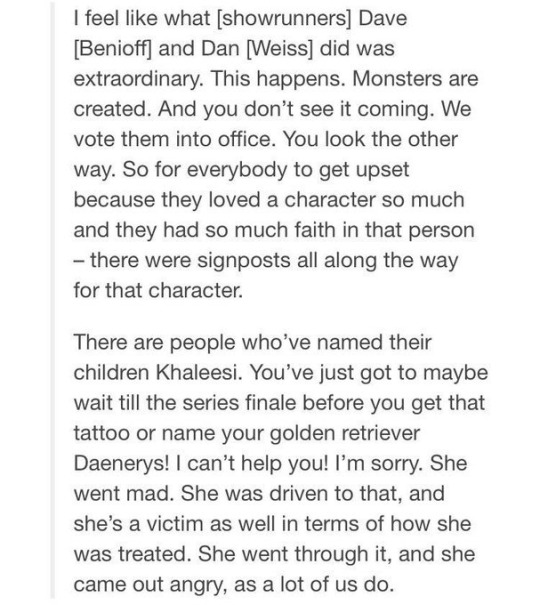
Rant from @hamliet
This quote is (likely unintentionally) gaslighting, ableist, terrible logically, and downright offensive.
First, ableism: why, why, why are we conflating madness with evil? She was driven to madness so she killed a bunch of people and had to be put down? And you think this is a great message in the year of our Lord 2019? [...] Additionally, while good writing is to an extent subjective, there are general consensuses on what make good writing--and Game of Thrones hit all the general consensuses for bad writing, from bad pacing to confusing character assassination. Critics are like, pretty united on this front. No one thought Dany’s turn made sense, even the ones who expect Mad Queen in the books. Maybe if people love a character who is meant to be evil you're not writing them correctly... or maybe they aren't meant to be evil.
Daenerys and Azula are incredibly similiar characters. They're both dragon themed, alligned with the element of fire, they're both colonizers they both represent the warrior princess archetype.
I'd say Daenerys is more of a tragic heroine though, because while Danerys is essentially doing the same thing as Azula, waging war in a foreign land and a culture that's not hers, for the purpose of then bringing back soldiers to her home continent so she can wage war again - while she is definitely a war mongerer she has good intentions. Daenerys for all of her faults, genuinely wants to break the chains and help out people.
I think Azula definitely sees herself as the hero for winning the war for the fire nation's sake, but she's completely uncritical of her own culture and she doesn't really have the good intentions that Dany has. She does it more out of a sense of duty, and her belief of divine right, not because she wants to break people free.
Daenerys's problem is that she doesn't understand the culture she's invading and the complicated world she lives in and despite all good intentions, is as I described above, invading a foreign power so she can go back and wage a war to reclaim the throne. Even if Daenerys would then proceed to go on to be the bestest queen ever that wouldn't change the fact her methods to get to the throne were incredibly violent, and she's sort of failing to break free from the cycle that led the Targeryen rule to fail in the first place.
Azula's problem is she sees herself as the hero and is therefore uncritical of fire nation values. She doesn't have any nobler intentions either other than service to her country, she just like Zuko is just trying to fulfill her duties as daughter and believe her birthright puts her above others. (I mean Dany does too but digressing).
Azula's more of a tragic villain who plays the antagonist role in the story, Danerys is one of the three heroes. However, she's more of a tragic villain in the sense that she's first season zuko pre character development just way more competent.
However, while Daenerys is a much more heroic character than Azula, here's the thing. I still think she's going to die. She is foreshadowed pretty heavily to die, and fail for her quest for the throne, because her entire story is a deconstruction of the warrior princess and the liberator archetype.
However, the story that GRRM is building throughout his books with Dany as an incredibly flawed heroine is different from what we got in the show, which was Daenerys going crazy and starting to murder people. That's because Daenerys turn to darkness wasn't about her character at all, it was just making her into a plot device to move their bad idea for a plot forward. That's why the turn is so unnatural and makes little sense with her character, that's why it's so rushed.
That's also why it's ableist, because it's using mental illness as a plot device to make a character unsympathetic and monstrous and give the other characters a reason to put them down.
The same for Azula, outside of one scene where he's talking to her mother, Azula's mental illness manifests in her screaming, maniacally laughing, looking like the joker did her makeup, and her instability also makes her violent and dangerous to be around. (Ignoring the fact that most people who experience delusions in real life are harmless, and more likely to be the victims of violence).
Her sudden mental illness isn't even used to make her more sympathetic in say Zuko's eyes and make him realize she's a victim, no it's just there to nerf her so she can be violently put down. The way she's drawn, the way she acts, it's to paint her as monstrous as possible. Her last action is like sobbing and screaming while being drawn as ugly as possible. She's not even given a small hope for recovery, because it just ends there. That's a pretty great message to send people that experience delusions, not only will you not recover or be shown sympathy, you'll also get sent to a mental asylum for the rest of your life. The choice for both Azula and Dany is not to portray any kind of mental illness in a respectful way, but to make a plot point happen.
As I said I expect Dany to die in the books, but there's a difference between dying as a tragic hero succumbing to your flaws but still having your good intentions acknowledged and just turning into a villain for no reason and being put down like a rabid dog.
(This is a quote I stole from a Shigaraki post but): "Why does she need to be put down in the first place, she has trauma, not rabies."
The problem isn't bad thing happened to my favorite character, the problem with the ending is it doesn't take Dany's setup into consideration.
Stealing from @hamliet again:
The thing about tragedies is that you have to manage expectations and clearly show that your tragic hero is doomed from the very early on–ie you have to show them making steadily worse and worse decisions (see: Eren Jaeger in SnK), if not directly tell your audience at the very beginning that this is a tragic story (ie see Greek choruses and Shakespeare, the prequels from Star Wars because everyone knows Anakin is Vader–plus I’d argue Anakin’s arc only works because we know he comes back to the light in the end. Audiences don’t like reversing on set up/undoing structure. To make Dany a tragic villain is to go against the structure of her arc in both show and book. That’s why people don’t like it, even if the books makes it seem more believable.
Kate then goes onto describe a character that's much more comparable to Azula's. Honestly Arianne is closer to Azula than Daenerys is.
You know who is set up as a tragic heroine destined to descend and die because of her flaws in the books, whose arc has almost certainly been combined with Dany’s in some sense in the show? Arianne Martell. (and another character known as f!Aegon) In the books, Arianne is incredibly ambitious, and especially resents her brother and his quest for power. Like Margaery (another tragic character), Arianne seeks power and is intelligent and manipulative in her quest for it. But Margaery’s fatal mistake is that in seeking power and prestige, she’s become more a pawn than anything else for a villain (Cersei). She chose to play with lions, and she’ll be torn apart; that’s not surprising. Arianne, as her chapters hint, is going to almost certainly marry f!Aegon, playing with fire, and die burning for it. Arianne’s grasping for her own power is never portrayed as cruel or stupid like the main human villain (Cersei); on the contrary, we empathize with a girl who truly cares about her people, but resents her father’s preferential treatment towards her brother. That’s the difference between Arianne and Cersei: Arianne cares. She is not cruel. But her pride is still going to get her killed.
There's a lot of game of throne females you could compare Azula to because GOT is full of queens, but like. Azula may be a tragic villain firmly on the side of the antagonists but she's not Cerseie. She's not queen, she doesn't wield the power that Cersei wields. In fact one of Azula's downfalls is finding out she doesn't have as much power as she thought she had, and ultimately was just a tool of her fathers.
She's not Rhaenyra or Alicent, because yes she may be grabbing for power but her character isn't affected by misogyny. Because once again, the writers simply didn't think about misogyny except for a really surface level "girls can be just as strong as boys" way so we really have no idea how women are seen in the fire nation. The show doesn't really explore if being a woman makes things harder, or makes people treat her differently than Zuko because the writers just didn't consider Azula's perspcetive on that matter.
Azula is alike to Danaerys in several ways, but as I said I think her ultimate end comes from Azula understimating her own importance in her father's eyes, and quickly realizing when her father is her only family left she never had his love or loyalty in the first place.
But Margaery’s fatal mistake is that in seeking power and prestige, she’s become more a pawn than anything else for a villain (Cersei). She chose to play with lions, and she’ll be torn apart; that’s not surprising.
Azula's most famous quote is about how Long Feng isn't even a player, only to find out her father considered her a pawn from the beginning and be broken by the revelation.
The difference being of course that Avatar is not Game of Thrones and it won't even kill the evil fascist dictator so it doesn't make a lot of sense to hand Azula the ending that Arianne got. They have the same fatal flaw.
Anyway, I made this big post but I can explain why Azula's tragic ending down't work in one sentence.
AVATAR THE LAST AIRBENDER IS NOT A TRAGEDY.
Maybe the reason Azula should get redeemed is because THE SHOW IS ABOUT F&%CKING REDEMPTION.
#bnha meta#mha meta#atla meta#azula meta#azula#princess azula#dabi#toya todoroki#shoto todoroki#azula redemption
415 notes
·
View notes
Text
(I can’t believe I finished this so fast… I basically blacked out and then it was done lol… Anyway, please remember that this is all just my personal opinion, and if you feel differently, that’s fine!)
Dragon Age: The Veilguard Review
Objectively speaking, Dragon Age: The Veilguard is a fun game that the average player is going to enjoy, especially if that average player is coming in without any prior knowledge to the Dragon Age franchise. I believe this is a good jumping-in spot for people who are curious about the world of Thedas. But in contrast, I have seen a lot of criticism from other hard-core fans that I largely agree with. However, it just so happens that most of the criticism I have is not enough to prevent me from overall enjoying the game. That is to say, for pretty much everything I did not like, there was also something I thought was great… Unfortunately, that makes it a little difficult to give a review. So, I’m going to do my best to keep things as clear and concise as possible by splitting up the “good” and the “bad” aspects of DATV.
The Positive
The best thing to come out of DATV is the new cast of characters that make up your companions and supporting associates. While I do think that some of them could have benefitted from more development time to flesh things out further, just judging what we ended up with, is mostly great. I especially found Emmrich and Bellara to be stand-out examples of strong personalities to grasp onto, whose personal stories really touched me in an emotional way.
DATV also has fun with some returning characters. For example, now that Solas is no longer hiding his identity, we get to see a character that both believably honours his part in Inquisition, while also providing a new, refreshing side to him. There are also a number of characters introduced in Dragon Age: Tevinter Nights that appear in the game, like my personal favourites Teia and Viago, who are an absolute delight to interact with!
I think the three act structure is good, albeit with act three being quite short. There are a few sequences that are an absolutely phenomenal mixture of storytelling and engaging gameplay, like all of Weisshaupt! I also really enjoyed stepping out of the main story every once and a while, and into Solas’s backstory through the Crossroads memories – what ended up being extra special about these is how they mirror Rook’s struggle so well, by the end. They are a nice touch.
The locations are beautifully constructed with smooth interactions of climbing, zip-lining, and essentially parkouring your way around, making them fun to explore! They also came with such distinct flavours and character in themselves that influenced a sense of truly experiencing different parts of Thedas, with different cultures.
The mechanic of building up strength with the different factions, and that actually having a huge impact with the ultimate showdown in the end of the game, makes side quests feel far less inconsequential than in Dragon Age: Inquisition by comparison. That, and they number far less.
I like that the story mode actually feels like a story mode; there were only a couple instances where I really had to worry about death, and even then, I was able to just toggle off the death with the customizable gameplay mechanics and continue on.
Finally, it would be remiss not to say that the character creator for DATV is the best BioWare has ever put out. I’d go as far as saying it’s one of the best in any RPG I’ve ever personally experienced. From the flexibility in morphing a character’s head and body between custom shapes, to the little details like sclera colour, vitiligo, and top surgery scars, makes it a shining example of what RPG’s should strive for. (My only critique here is that it would have been nice to have more skin colours.)
The Neutral
I hated the combat for pretty much the entire first act of the game. I found it too hard to keep up with, and too much like Mass Effect bullshit. I can’t say that it’s completely grown on me yet, but I don’t hate it anymore. It’s fine. So, I’m giving this a special little spot before I get into what I didn’t like all the way to the end.
The Negative
As mentioned above, I do think that there is more that could be done with some of the characters to really achieve their full potential. Davrin and Lucanis—while to be clear I still really enjoy as they are—come to mind first, in terms of those who would have benefited from more development time. Most of Davrin’s screen time just revolves around Assan rather than Davrin himself, and Lucanis is so restrained that it takes a while to really crack him open. Both of these characters have intentional personalities that make them harder to get to know, I understand that, but I feel that it would have been all the more rewarding to have more time dedicated to their company after earning their trust and possibly endearment. Instead, it feels like their romance and friendship with Rook are only half-complete, and then rushed to finish.
There are some companion interactions that are just… cringe. There is no other word for it. Now, this is nothing new for BioWare games, but I feel like the “pulling a Bharv” scene for example, was hitting an entirely new low. (If someone misgendered me and then just started doing push-ups instead of just saying “hey sorry about that, I’ll try to do better” I’d be annoyed, not satisfied.) I also felt like most of the temporary rivalries between companions were artificial in nature, rather than organically part of their characters that actually served a purpose. We already knew Emmrich likes books and Harding likes nature; we did not need a whole cutscene with them bickering about camping. (The exception to this is Davrin and Lucanis, who genuinely had room to grow as people out of their multiple confrontations, not just a one-off scene.)
The music in DATV is, for the most part, forgettable and bland. There is one piece that really stands out, and that’s “Where the Dead Must Go”, which is a real banger. I am not a fan of Hans Zimmer’s OST otherwise; I think it is phoned in, just like most of his work. I deeply wish BioWare would have just stuck with Trevor Morris. The best parts musically in this game are just Morris’s work re-used from Dragon Age: Inquisition.
There are certain parts of disjointedness that separates DATV from the past games that are just… bizarre. This is especially the case when it comes to elven lore. For example, Bellara saying she is afraid that elves will be harshly judged for the Evanrus, or Harding saying that elves are “thriving”… as if modern elves are not deeply persecuted across most of Thedas. It made me question more than once if there just was not time in development to do a proper canon-compliancy check with everything, perhaps?
I want finish this part by bringing up again that the biggest flaw in DATV is that it feels very corporate. To repeat what I said in this post: It is as if a computer ran through the game’s script and got rid of anything with “too much” political substance, in an overcorrection to be “safe”. But now that the edges have been so smoothed down to make a block into a ball, it can no longer support anything.
Conclusion
It’s easy to see a lot of creativity went into the creation of this game… but it is also easy to make assumptions on how that creativity was constrained by development hell and corporate oversight. In the end though, Dragon Age: The Veilguard succeeded in being an overall good time, one that I will no doubt be putting just as many countless hours into as the previous installments in the franchise. 7/10.
187 notes
·
View notes
Note
Any thoughts on the Stodehttcennoc code and all the Ciphertology lore it gave us? It’s interesting to get such a look at what an actual bill cipher cult looks like, even if the majority of it is played for surreal laughs.
yeah, i'm changing all the death valley girls' last names to Cipherwife
Right when I thought we'd run out of big packets of lore and were down to the dregs, we get the stodehttcennoc story, immediately one of my favorite things to come out of TBOB. In no particular order:
a Snapewives reference??? Unexpected. Hilarious.
i LOVE the mental image of just how unhinged Bill must have looked running around in Silas's body. Like i'm imagining that by the time of the big showdown at the end he's wheeling around his limbs like Jack Skellington dressed as a scarecrow cackling like a maniac surrounded by flame. Did he have fun, i think he had fun, it sounds like he had a lot of fun. I had fun.
on a doylist level i understand that Alex wrote Bill stealing all the wives in town because that is, in fact, something that real cult leaders tend to do. however real cult leaders tend to do it because they're straight human men horny for human women and realized their power lets them get away with anything they want. so on a watsonian level, why'd BILL do it?
LOVE the look into how Bill recruits people into a cult. His interview is actually a very good example of REAL cult recruitment tactics: mystical manipulation (using tricks to make you look magical/holy/psychic/etc); driving wedges between a recruit and their loved ones; flattering the recruit, offering to help their dreams come true; but dangling the answer to all their problems just out of reach, only after they make a big commitment (often financial) (and then you require them to keep upping their commitment); pressuring them FAST to make a decision, don't give them any time to think... that's actually how it works, all packed into one page
did bill take 100+ wives because HE's horny for human women? Is he horny ONLY for female humans or did he just figure he couldn't get away with also marrying the males in 1952 rural Kansas?
Something about Bill being delighted about having so many fingers just tickles me. Especially after he dissed humans for only having five fingers in TBOB. Human hands are a joke, are they?? Seems like five fingers are enough to make him happy! ... i realize how that sounds, i won't apologize for it
I feel like a cult that's willing to eat off its fingers for you and turn a blind eye to you taking 100+ wives would probably not draw the line at something as prosaic as homosexuality. Bill, you could have had 100+ husbands too. Why didn't you.
to me, somehow the goofiness & speed at which this cult came together felt more sincerely Gravity Falls-ish than most of TBOB. Like TBOB is still Gravity Falls, but most of the content doesn't feel 100% Gravity Falls. Bill Speed-Recruits A Cult While Wearing A Corpse He's Frantically Trying To Keep From Falling Apart feels closer to 100%. It's got that je ne sais quoi, that core dumb silliness.
Why did you want over 100 wives, Bill Cipher. Why only wives. What was your motivation.
This works well with my headcanon that Bill's bread & butter isn't just manipulating individuals, but specifically cult leadership. And it's given me a lot of material to work with in as far as writing him as a cult leader. I underestimated how himself he's willing to be while courting fresh victims, I figured there'd be more "trying to sound normally appealing by human standards" going on. He calls his soon-to-be cultists dim plasma bags before he even started pitching his cult. He's REALLY willing to let his charisma do all the heavy lifting. His technique clearly isn't "convince you that he's offering the things you want" but "convince you that you want the things he's offering"
Was stealing all those wives just a power trip, Bill? Is that all it was? If it was, wouldn't persuading guys to marry you in 50s Kansas be an even bigger power move??
how did Silas get involved in this. We don't see Bill take one corpse and KEEP piloting it for long periods of time like that anywhere else, even though it's clearly an effective method of interacting with humans. Was Silas just a conveniently available corpse, or did he make a deal with Bill before he died? Or maybe Bill DOES do this frequently, and it's how he starts most of his cults.
He CAN'T have taken all those wives for "I'm attracted to humans but only the female ones" purposes. In spite of the sheer quantity of references to female exes I am unable to believe that this triangle is heterosexual.
I'm requiring anyone who draws young skinny white human Bill Ciphers from hereon to switch from the sexyman human Bill to Silas Birchtree. 1950s huckster with a golly-gee-whiz face and evil in his eyes and rot on his breath is the pinnacle of what any young skinny white human Bill could possibly be. Also it's interesting to see Bill's justification for being a snappy dresser, that it's a trojan horse for chaos.
questions about bill's orientation aside, my gut says Bill MUST have wanted a bunch of wives and not husbands for some other reason, he didn't ACTUALLY want 100+ wives for sexual/romantic purposes.
or did he
bill explain the cipherwives
355 notes
·
View notes
Note
OH btw did Shen Yuan go to Huan Hua Palace after leaving the abyss (forced by the system mayhaps??) or did he just happen to go to Jin Lan City separately?
[link to og au here]
i feel this is contingent on the goals that the system gives him. i think for the purposes of this au, the system actually wouldn't be too specific in the goals that it gives shen yuan? like, for example, i'll list a couple of major plot points that he'd have to complete.
one ) setting up the plot — reveal your demonic nature to luo binghe and go into the abyss at the immortal alliance conference
two ) survive the abyss — become a worthy adversary!
three ) epic showdown — wield xin mo against luo binghe!
i feel with more specific goals that would end up between all these, the plot would get a bit messy. so shen yuan has these three major ones to hit and otherwise? i don't think he'd feel the need to go to huan hua palace at all. i'm trying to think of a reason why he would need to and coming up a bit blank. in my head i think shen yuan would try to act as a wandering cultivator trying to do some bits and pieces of good when he gets to the human world again but always gets misunderstood/misconstrued so everyone around him is like! this foul demon! because the system demands there be an antagonist. if that makes sense.
and like! aside but i think the third mission from the system would end up being luo binghe sacrificing himself to get rid of xin mo for shen yuan's sake rather than the battle shen yuan was expecting to die in.
tldr i think it would be a coincidence that he ends up in jinlan at the same time everything goes on. but like. a system-supported coincidence.
masterpost
#svsss#svsss au#scum villain#scum villain's self saving system#shizun luo binghe#disciple shen yuan#milez asks!#milez's role swap au
87 notes
·
View notes
Text
Writing Notes: Falling Action

In storytelling, falling action - the period after the dramatic confrontation of the climax.
This portion of the narrative helps deflate the plot’s tension and gives the character time to unwind after the emotional scene.
The falling action is critical in Freytag’s pyramid, a diagram of plot elements named after nineteenth-century German writer Gustav Freytag.
The plot diagram starts with exposition, followed by an ascending line of rising action that begins with an inciting incident, a turning point at the narrative’s climax, and a downward slope of falling action. Finally, the diagram features the denouement or resolution.
Tips for Writing Falling Action
If you are constructing falling action for a story, keep the following tips in mind:
Pace your story. After the story's climax, you shouldn’t be too far from writing the resolution, but you still want enough room for the ending not to feel rushed or sudden. The falling action helps bring the climax to a resolution.
Be conscientious. Many readers will notice if loose ends are not adequately resolved at the end of the story. It’s good to keep track of all your characters and plot threads, not just the main conflict, and ensure that you bring them to satisfactory conclusions.
Keep it interesting. Even after a narrative’s climax, there is often more to reveal. The main character may have additional responsibilities to meet, or unanswered questions of the plot might need addressing. This will help carry the reader through the falling action of your story.
The falling action in literature can have different uses in a story’s plot structure. Reasons for including this stage of the narrative in your writing are:
Emotional release: The falling action of a story can be thought of as a deep breath after the intensity of the plot’s climax. If this part of the story were to resolve too quickly, it might feel abrupt, even jarring, after the build-up to the climax.
Realism: Falling action can also help maintain the narrative’s sense of authenticity. Life has long, relatively uneventful periods with some moments of climactic intensity. The reader will recognize the process of things gradually returning to normal after the climax of a story.
Tying up loose ends: Often in stories, there are various subplots and secondary characters. Not everyone can be involved in the pivotal moments, but the function of falling action is to help tie up loose ends and satisfy the reader’s curiosity about the fictional world as a whole.
Examples of Falling Action
Falling action takes different forms, depending on the narrative, the genre, the storytelling form, and the author’s style. There can be falling action in novels, films, plays, short stories, and epic poetry. Some examples of how falling action serves a narrative include:
William Shakespeare’s Othello (1603): In William Shakespeare’s Othello, the climax occurs when Othello, having been manipulated by Iago into believing that his wife Desdemona has been unfaithful, murders her. This occurs in the play’s final act, but considerable action follows it. Shortly after Desdemona’s murder, Othello, confronted by Emilia, Iago’s wife, begins to realize Iago’s treachery and the fact that his wife had remained faithful. Iago’s rage leads him to murder his wife, Emilia, although Othello knows the truth by now. Consumed with regret and the impossibility of redemption, Othello kills himself in the tragic resolution.
Robert Louis Stevenson’s Treasure Island (1883): In Robert Louis Stevenson’s Treasure Island, the climactic action occurs when the buried treasure goes missing, prompting a final deadly showdown between the mutineers and the remaining members of the schooner’s crew. Shortly afterward, the actual location of the treasure is revealed, and the falling action of the plot covers the recovery of the treasure, its transport back to the ship, and the return to civilization.
Franz Kafka’s The Metamorphosis (1915): In The Metamorphosis, the scene featuring Gregor’s appearance while his sister plays violin leads to a climactic emotional breakdown and the angry lodgers’ denunciations. This is then followed by the falling action of Gregor’s death, the lodgers being kicked out, the charwoman disposing of Gregor’s corpse, and the family taking a day trip, wherein their mood lifts as they contemplate the future.
F. Scott Fitzgerald’s The Great Gatsby (1925): Many critics consider the violent scene of Myrtle’s accidental death the plot’s climax. The distraught George, mistakenly assuming that Gatsby was Myrtle’s lover and responsible for her death, murders Gatsby. This is followed by Gatsby’s funeral and Nick’s ruminations on human character and fate, which close the novel.
Source ⚜ More: References ⚜ Writing Resources PDFs
#falling action#story#fiction#writing notes#writeblr#literature#writers on tumblr#books#writing reference#dark academia#spilled ink#writing prompt#booklr#creative writing#bookblr#light academia#writing inspiration#writing ideas#writing resources
120 notes
·
View notes
Note
(I have two statements, I’ll start with the least relevant one first and the more relevant last so it (hopefully) sticks more.)
NOTE (mainly for the irrelevant one): I have no ill intent behind anything I’m typing and just want to thank Akane for unintentionally teaching me a thing or two about art.
Irrelevant statement: I’ve seen many people talk about how your AU and overall artwork inspired them to do comics (heck, even I once told you this), but something else your art has helped me with greatly is anatomy.
My countless drawings I made of your KFC gang helped me simultaneously with fat and very lanky bodies, height differences, etc.
Now I’m kinda wishing I drew your version of Susie so I can properly learn how to draw muscles. Not all of my own characters are human and muscles are something I can kinda draw, but it always comes out a little weird looking…but I’ve been kinda nervous to draw TR!Susie and Ralsei in fear of then looking to different…
Relevant statement: I can see why you were proud of this page. I love the heart-to-heart between Kris and Susie. It makes me wonder if we may see a backstory or may learn a little more on Susie’s past.
Kris and Frisk are the main focus, so this “mini”-page felt like a nice change of pace and a good addition to the script that leaves me with some pretty cool predictions. Even though I’m probably getting my hopes up because as you said, this wasn’t originally part of the script, I still wonder where you may go with this…
Representation is something incredibly powerful. Not only does it help with being feel seen in a medium you like, it also INSPIRES artists to step out of their comfort zone and try their own hands at drawing different body types, sizes, etc...
Muscles are kinda sorta difficult. Like with most things in art, it all comes back to anatomy. That is the basis of drawing bodies. If you got that down is when you can start to stylize. Of course you don't need to study every single muscle in the body, but something that helps is using references or do figure drawing for example! There are plenty of free images online just for that kind of stuff. An artist who doesn't use references is just willingly making things harder for themself. In case of drawing muscles, look up all sorts of different athletes! It all depends on what kind of built you are going for. Athletes train their bodies specifically for the sport they're are doing, so the muscle distribution and built will be dependant on that.
As for your other statement... as you said, the focus of the story is on Kris and Frisk, so there isn't exactly enough room to wrap up everyone's dynamics. Especially considering how close we are to the trial. Which is basically the final showdown. We got 46 pages left to go. So you'll see how the story will play out. There is still room for these characters to grow after Twin Runes ends. But that will be all up for interpretation. Because after Twin Runes ends I will start The Other Script.
90 notes
·
View notes
Text
Stolas: A Gradual Descent to the Bottom of the Bottle
This post analyzes Stolas's situation with alcohol and discusses whether the show effectively represents this systemic issue, and what it implies about real life.
The take is certainly not unique, but I decided to post it anyway to spread awareness about how subtle, seemingly harmless, occasional drinking can seamlessly turn into a full-blown addiction over time.
TW: substance abuse, addiction, alcoholism
Is Stolas an alcoholic?
The answer seems obvious at first. You look at him—all posh, intelligent, and articulate—and you might think, "He doesn’t look like one." You won’t find him, Satan forbid, somewhere under a porch, or truly dependent on the bottle, like drinking during the day—or not absinthe, anyway.


Sure, he drinks sometimes, but it’s fine . . . right? Everyone drinks sometimes. Everyone deserves to feel a bit happier after something bad happens once.

Or twice.

Or thrice . . .

. . . Oh.
Not so obvious anymore, eh?
The real issue here is that the answer is kind of between 'yes' and 'no.' My TL;DR is that the show makes it pretty clear his drinking is becoming problematic, but it’s not quite there yet. And it will become alcoholism soon enough if nothing changes.
I think what we see happening to Stolas right now is an excellent, textbook example of how people end up there. So let’s get into his head, explore where he stands, and what it means for us and for him.
It starts easy
It doesn’t happen in one day. It's not like you get up early one especially glum morning and decide, "Hey, that's a good day to ruin my life!"
It's a vulnerability that makes you susceptible to drinking. Constant pressure. Anxiety. Depression. Trauma.

And you might find yourself wanting to do everything, anything, to get it out of your brain. Not think about it for one evening. Forget.

What a pathetic fucking man!
Her attacking you, whether physically, verbally, in public or private. You, having no one to turn to, having no way to mend it, having to keep up appearances for your kid.
We all have bad days. Bad situations. It’s not to say that one wild night is inevitably going to turn you into an alcoholic. But when you allow the bottle to be your crutch for life, when it becomes a habit to avoid uncomfortable, traumatic events, then . . .
Then it turns into a coping mechanism
You know, it’s . . . it’s simpler. It’s comfortable. Soothing.
You can’t kick her out of the house. You can’t make the man you love love you back. You can’t get a support network because she ostracized you from royal social circles and made a laughing stock out of you.
But you can forget. Forget that one excruciatingly humiliating night. Where not only was all your dirty laundry thrown out on the dance floor for everyone to see, but also, that said romantic interest made it clear it’s only about sex.

You used to have a smoking wife, a kid, you had it all! I hope you didn't give it up so you and him could get it up

Stolas, don't act like what we have is anything but you wanting me to fuck you, okay? You make that really clear all the time.
Forget well enough to fall asleep drunk on the floor among the only living beings who didn't run from you yet. Maybe only just because they are in pots and don't have legs.
And it spirals out of control
Things get gradually worse. Your only lifeline—your . . . uh, romantic interest and daughter—fall out of reach. He finds every reason to avoid you. She hasn't visited you since that LA incident.
Your only power move with a divorce request turns into a lengthy, exhausting proceeding and leads to an assassination attempt. Your—what are you even anymore?—romantic interest pretty much ignores your distress call, or so you think.
You go with a showdown. You can't stand the ambiguity anymore. You want to know whether there's something behind your transactional thing. It's either 'yes' or 'no,' and . . .
It doesn't end too well.

Lastly, you go to a party to try to unwind (or at least be polite, because it's rude to ignore invitations). But your ex's (???) ex acts cruelly, and you don't feel comfortable there. And the wound is still fresh, bleeding . . .



Fuck it, the absinthe won't cut it. Beelzejuice it is then.

And here we are, back to our starting question
Stolas wears a functional alcoholism guise. Or dangerously close to it. Because that's what I believe is going on.
He is still a functional member of society, but he is shown not being capable of processing his trauma without the bottle in hand. And, as things get worse for him, we see the bottle or the glass or any other alcohol container more often on the screen.
For now, he's hanging on, but it's just a matter of a flip switch—the moment when every second of his life will start to feel unbearable without alcohol, simply because there are no other ways to cope.
It's worth noting, though, that Stolas isn't the only character depicted struggling with the urge to drink away his problems.
The most obvious example is Verosika, who is a severe case of alcoholism. We won't delve deep into her character since I want to focus on gradual decline rather than the end result, but we rarely see her without a bottle. There are a couple of scenes where she doesn't hold one, but these moments are situational. She's also been to rehab at least once and only got out because of her reputation.



But there is another character I'd like to dissect, because this will answer the lingering question, "Is there a way out?"
Blitzø, and why he didn't fall victim to this
We saw Blitzø drinking too, at the Bee’s party. To a rather disturbing degree, actually.

But why does no one say he has an alcohol problem, even though he did use alcohol as a coping mechanism?
Because Blitzø is an example of how the addiction might be prevented and what ultimately makes a difference, a turning point.
To start off, we first see him not in the bar. We see him at home with a pint of melting ice-cream. Dude sugar-bombed himself to sleep . . . after the already mentioned disastrous date with Stolas at Ozzie's, that is.

And then he gets a call from Loona, who asks to pick her up from the party. He has no plans to stay there whatsoever.
But what changed his mind? Pressure did.

He was pressured by both Loona and an old acquaintance to stop by. (I stress that no one is wrong for this, by the way—he still had the agency to turn the invitation down.) He reluctantly agreed to one drink . . . which we know how ended.

It's much harder to keep it to just one drink when you're sad and alcohol makes you feel better. Nobody wants to be sad.

But with all that said, Blitzø is extremely resilient. In contrast to Stolas—who is strong in his own way but slipping despite all the privilege, magic, and immortality that Blitzø thinks make him invincible—Blitzø never let that one drinking occasion become a habit.
Because he has a support network. However closed off he is, he has his business to take care of, Loona, and M&M. He has things he likes to do and he has people he cares about.
Stolas has all the money in the world, but no friends or activities he could look forward to. He doesn't seem happy with his royal life at all, referring to himself as an owl in a gilded cage.

So the difference is, essentially, this: Blitzø has alternatives and doesn't see alcohol as an outlet. There is a wonderful post from @warblogs17282 which has similar points I make, but also, it shows another angle of Blitzø's relationship with alcohol—his, unfortunately, long history with addiction in family. So that contributes, too.
Is Stolas a lost cause?
Gods, no. But it’s definitely a problem by this point.
Is he an active alcoholic? Maybe not yet. He isn't Verosika yet. But he is getting there, which I think is the point the show makes.
Alcohol might be a one-time patch on especially rough days, and you might wake up the next day strong and aware enough not to make a habit of it. But the problem is, Stolas already has a habit, and he doesn't have anything to replace it.
To solve it, he needs just that—a replacement for the bottle. Someone who cares. My hope is that one particular red lizard will share his pint of ice cream and his love. And maybe then, grim days won't be as grim anymore, even when the absinthe stays in the store, or wherever these royals get their alcohol.
Closing note. Why it’s important to talk about this in real life context
Warning: Extreme TMI
I had an alcoholic in the family, and this topic triggers me because, for him, it also started as "no biggie."
He was still functional for years, coming to work regularly. But he was slipping. He drank more, skipped work, and eventually became unbearable for his family—my family, even if not immediate. His wife requested a divorce. He got isolated. He drank even more. Eventually, he got fired because it's not appropriate for a director to skip work and reek of ethanol. The smell was so strong that people couldn't be in the same room with him. He tried other jobs. He aced interviews thanks to 30 years of experience and a solid background. But he got fired again because he couldn't live up to his legacy anymore. At the end, he descended into what you would call full-blown alcoholism.
So, you followed his story, and my question is: Did it start here, when he couldn't help it anymore? Or did it start a couple of years before that, when alcohol became too comfortable as an outlet for struggles?
I've had rough months too—with the war in Ukraine and everything happening with my family—when I realized it became comfortable for me to drink my problems away. Because it works. Because it’s pleasant not to deal with anything, to force your brain to shut up and be happy for one evening.
And it's terrifying to realize I had (thankfully, I don't have anymore for a long time by now) those patterns of thinking: "Jeez, I just want to drink and forget this happened."
Because I saw where it leads. And the farther you go, the harder it becomes to say 'no.'
So please, pay attention to the ones you care about. Pay attention to yourself.
#tw alchoholism#tw substance abuse#tw addiction#this has gotten really personal#but I hope I got the point accross#a random fact - this owl forced me to learn how to spell absinthe properly. I mean. Write it down without looking it up in Google XD#Gods Stolas of all drinks you've chosen the one with the batshit spelling#of course you have#forgive me making jokes about this#but I couldn't NOT mention it#helluva boss#helluva boss spoilers#helluva boss ozzie's#helluva boss queen bee#helluva boss the circus#helluva boss full moon#helluva boss apology tour#stolas#blitzø#stolas goetia#verosika#helluva boss meta#akira's whimpery metas#stolitz#stolas x blitz#blitz x stolas
102 notes
·
View notes
Text
Why Sound Design is so Important in Games
Sound design is a key point in games, though it is often neglected in college games where we do a lot of work without speakers on. Having some good audio in a game really helps elevate the experience beyond just being a solely visual medium, as much as audio changed silent movies. The games with the best sound design are often those with realistic sound systems, or ones that elicit the desired emotional response. Good sound design can make you terrified to turn a corner; it can make you cry in the game's saddest moments; it can turn a level from a selection of rendered polygons to a truly real-seeming experience. Obviously our game's sound design isn't that deep, but it doesn't add nothing to the game either.
The first game I am looking at is Thief: The Dark Project. This game came out in 1998, but I would say it still holds up today with a few patches to make it run on modern systems. The game has a unique stealth system that lets you hide in shadows, but the main thing we're looking at is the sound. Different surfaces are different levels of loudness when walked on - carpet is perfect for sneaking, but metal catwalks are loud and clank under your feet. This isn't just set dressing either, because enemies are more likely to hear you if you're clanking about on steel grating. Then there is the ambient sound, where you can hear nearby guards muttering or whistling (in a great bit of game design, this helps you keep track of them when they're out of sight), torches crackle, and strange ambient screeches echo down hallways. The ambient soundtracks in each level are interesting, and use a lot of electronic synthesiser noises, which gives them an 80s John Carpenter vibe. They help make the environments foreboding, but also help tell the story in a way that 90s graphics simply could not. For example, as you enter the deepest annals of an ultra-religious Hammerite compound, the ambient whirr of machinery gets replaced by solemn choir and hymns. Caves can have dripping water and the occasional crumbling rock, while more twisted forest environments have the endless chirring of insects and chuckling from unseen nymphs and satyrs. The actual sound technology is also really good for the time, because it supports sound cards, even though they aren't used too much anymore. With them enabled, you can listen against a door and gauge how big a room is based on the echo of the guard's voices inside. Even for today that is fairly advanced, and as far as I know, not present in many other games.
youtube
The next game I am looking at is Hunt: Showdown. It is a 2018 horror shooter taking place at the end of the 19th century, where you play as a bounty hunter trying to kill various cryptids and monsters. The game uses the Cry Engine, so it already looks good on a visual front, but the audio is also phenomenal. Most of the quality comes from its directional sound system, which is so specific you can tell where players are through buildings, which is useful for lining up shots when you don't have a good visual read on their whereabouts. Every gun also has a unique sound and echo, which allows an educated player to guess what weapon has been fired, from what direction, and even from what distance. The way that the game calculates sound waves travelling is a very unique and realistic system; a gunshot ringing out over an open field will be louder and clearer than a gunshot fired in the middle of the thick backwoods. I assume this is a built-in feature for CryEngine V because I know of no other games with this level of realism when it comes to sound - I can only assume it calculates for windspeed and other factors and then runs the sound effect through various in-engine filters.
youtube
Finally, I will look at The Elder Scrolls V: Skyrim. One of the lesser-mentioned qualities of this game is its environmental sound design, which help the various holds of Skyrim seem like realistic places. The wind whistles about your ears, giving you a good sense of your player's altitude and the temperature around you. In the mornings and evenings, you can hear crickets chirring and birds chirping. The rushing of rivers sounds different depending on the course - swelling into a roar of white noise in the rapids, but dissipating to a trickle when the river becomes a lazy stream. Then there are more ethereal sounds, like the creaking of the aurora borealis on winter nights. Towns have their own soundscapes also, with the creaking wood of huts and the crackle of flaming torches. The ambient music by Jeremy Soule (the same guy behind the LOTR soundtrack) also adds a lot to the game's atmosphere, with majestic orchestras making even a simple walk through the valleys a much more emotive and captivating experience. However, you can play with the sound turned off and just listen to the layered soundscapes.
youtube
From my research, I can see that the main theme that makes a soundscape good is attention to detail. Not just having one sword hit sound, for example, but several, altered depending what material you strike, and echoing with a different resonance depending on where you are. I would say that with Wallpaper of the Mind, we have achieved this as best we can in four weeks, with the different footstep surfaces. The sounds I myself provided were more stock quality, but it doesn't matter, because how sound is used mechanically is just as important. I will make a blog post on this soon.
88 notes
·
View notes
Text
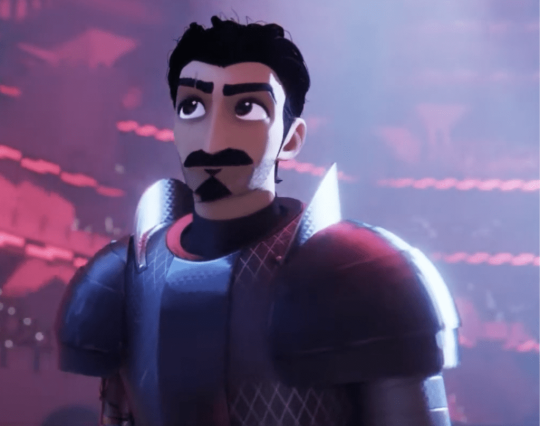
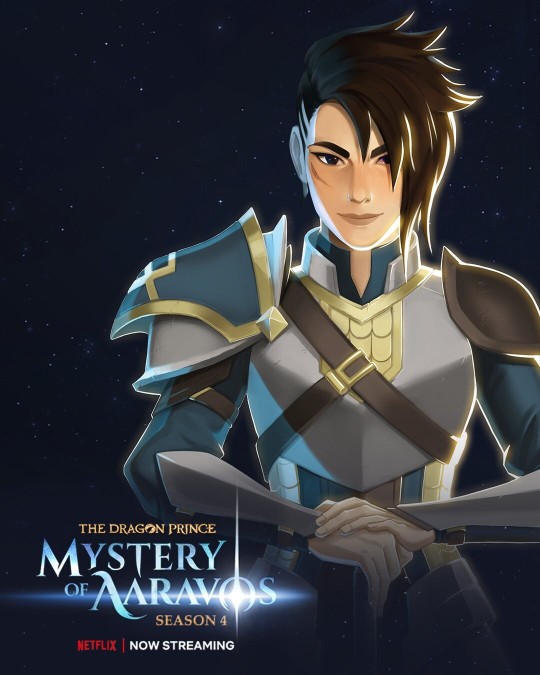
Sword gays showdown, round 3, bracket three
Propaganda:
For Ballister:
he could tell when his sword was switched out for a fake, graduated top of his class so we know he's a good fighter, also the scene where he's fighting is hot because he's so confident with a sword in his hand, also he's gay
A canonically gay, disabled, South Asian man takes down the government with his genderqueer shapeshifter sidekick/adopted daughter! He has a swordfight with his ex-boyfriend! in which he defeats about 20 knights singlehandedly!
top of his knight class this man is a master swordsman
(Movie) He has used a sword since he broke into the Institutes training ground and ended up becoming a knight
He has very divorced vibes with Ambrosius and he uses a sword.
He's a legit knight! So, it's in the fine print.
According to the Nimona movie, Ballister here has been practicing the art of sword fighting since childhood to earn the trust of the city and he was SO CLOSE to becoming a knight. He's also definitely not dating another one of his knight mates (?). Nope. Not at all. This movie is super straight /s I think he also beats an entire army of knights with nothing but his sword and a chaotic good shapshifter so that's pretty cool. He's also south Asian, has a prosthetic arm he made himself and is honestly such a goofy guy (in a good way ofc) if that's anything.
For Amaya:
Badass super strong disabled lesbian general who can and will take you out. Doesn't need a sword to punch you into next week, but will use one anyway.
She’s married to another sword gay and she’s also disabled so I love her very much
First deaf character I saw in any cartoon, she's very badass and protects her kingdom's border, later falls in love with an elf warrior princess she once fought. In the new season, they're planning their wedding while trying to navigate political tensions between the elf society and humans. Some of the elves aren't super into the idea of a human marrying one of them, which isn't for homophobic reasons but still (I believe) meant to mirror real world conservatives (really liked a scene with Janai's brother telling Amaya she's fine as a girlfriend for Janai but actually *marrying* her is too controversial and political. Whoever wrote this did a really good job).
She’s currently engaged to another lady, she uses a sword, is a general badass.
General Amaya is a standard sword lesbian with a cool shield and some funny "lines" example: "This bread is...." *bashes bread on table with no damage to the bread* "Weapons grade"
#sword gays showdown#ballister blackheart#general amaya#the dragon prince#nimona#ballister boldheart#tdp
270 notes
·
View notes
Text
ava has an issue with characters' driving forces
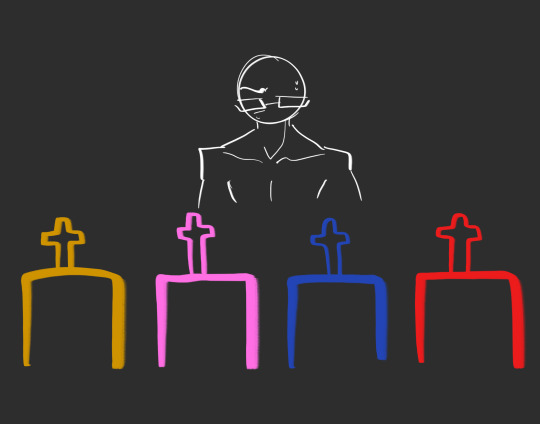
this post does have spoilers for the new episode, so i'll put this all under a "read more"
disclaimer goes away after a week, i will edit this post so be warned
there's a trend i've noticed when it comes to the main antagonists of ava and avm. theres a common theme amongst all of the villains (i'm counting second and chosen, since they are technically antagonists per ava season 1). let's explore this.
case 1: king orange
it's obvious that the thing motivating king to take over the bastion and get the minecraft icon is the fact that he lost his kid, and to an extent the kid's other guardian (wife, husband, s/o, pick your favorite); he creates a literal black hole in order to see his kid again because of an incident he couldn't control. not to mention king orange also lost purple's trust, and their support as a whole, which further emphasizes the loss of his son given that purple was a second chance, and he messed it up by losing sight of their relationship. this is something that king orange couldn't willingly control.
case 2: purple
purple experiences two kinds of loss: death and abandonment. obviously lapis (regular blue) abandons the family because they didn't approve of orchid (pink) coddling their child, something that purple couldn't control. then purple has to live with the fact that their only other parent is dying to some unforeseen reason, likely illness, and that too is something that they couldn't control.
case 3: second
second is more interesting, because it's something that gets glossed over. they're the antagonist in ava 4 up until the very end, and why does second do the things they do? because they lost their friends to something (someone; alan) they couldn't control and this is repeated in showdown; second watches dark kill their friends because of dark's own spite and hatred, which i will cover next. that is something second cannot control
case 4: dark
i think dark is a really good example of this trend; they were made to attack chosen and lost control, ultimately losing and teaming up with chosen to work against alan. then they convinced chosen to go on a conquest to essentially take over the world, which ends in dark losing chosen's trust and support as a friend due to beliefs that dark couldn't control (chosen's own morals)
case 5: chosen
compared to everyone else, chosen experiences loss and the inability to maintain control in different ways. they fought back against alan and, as punishment, was forced to be alan's pop-up window destroyer against their own will, and they can't control it then he does, freeing himself, prompting dark's creation, and eventually befriending dark and teaming up with them to destroy the world. they grew distant, not sharing the same beliefs and reasoning as dark anymore, and directly opposed dark during the virabot sequence. this all leads to chosen and dark fighting during the showdown, which is when chosen ultimately watches second kill their former friend and can't control that
case 6: victim
the whole reason why this post was made is because of victim's whole deal with mitsi. they endured abuse, lost the upperhand in that initial fight with alan, took matters into their own hands and fled the computer then met mitsi, fell in love, started a company together, and they lost her in a situation that they couldn't control, that being chosen and dark destroying newgrounds
if you couldn't notice already, there is something that happens between every single antagonist, and that's the fact that every antagonist has lost something due to circumstances they can't control
obviously the circumstances are different. majority of these antagonists have experienced loss through death, while a handful also experienced loss through losing control, losing free will, so on so forth
"why is this an issue?"
put it this way: every single antagonist is being driven by the same exact thing, just in different fonts
every single major antagonist, in some way, shape, or form, loses something. as a result they are driven to get whatever they lost back, whether it's a loved one or the love of someone that is now gone (or in dark's case, trust).
i personally believe that there was a lot of missed potential within the antagonists, as i'm sure some people think, and i think it's because instead of having characters do things out of spite or out of sheer evil, it's in an attempt to get something back.
the reason i'm saying main antagonists and not villains is because in the case of youtube from animation vs youtube, the corrupt video green in the influencer arc, the pokemon universe in animation vs pokemon, and even the entire animation vs education series, the antagonists aren't going against second and the color gang because they lost someone dear to them or they lost the affection of those around them
case in point: corrupt video green. they were never loved to begin with, and that is what causes them to lash out at the color gang and fight them. everyone turned their back on them because they were imperfect, because they loved other creations more than them
also case in point: animation vs math. euler's identity only combatted second because second was technically the one that invaded their space. they're not trying to bring anyone back to life like king orange was, they were just protecting their territory
my thoughts are a little incoherent right now but i have a point, that being that the antagonists should have another reason to do the things they do that isn't just "oh my wife/son/friend/dad and mom died"
70 notes
·
View notes
Text
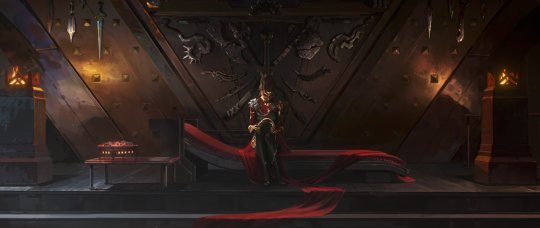
Mel having the hilt of a sword above her head like the sword of damocles not only indicates the treacherous nature of the power she's inherited from her mother from assuming the position of THE Medarda and the wolf but the fact that the sword disappears behind her as if its piercing her shows that shes already suffered the consequences of having this power (losing her family, losing her home in Piltover).
Not to mention the way both she and the room are clad in red, silver, and black, Ambessa's colour scheme. I think this indicates that although she's become what she's supposedly always wanted (a daughter her mother could be proud, a ruler) the smallness of her in this shot illustrates how overwhelmed she is (maybe emotionally but also quite tangibly by her responsibilities increasing tenfold) by the presence of her mother's legacy.
Mel demonstrates that she is an adept councillor in Piltover. The position suits her social abilities well enough to easily sway other members of the council. However, the system of power in Piltover does not allow for substantial revolutionary change for example Jayce despite government backing is unable to fully realise his dream of his research being utilised for the sake of everyone's health and safety instead it is bastardised and its original purpose is diluted made into gimmick. The extent of the progress 'the man of progress' is able to make is diminished to hexgates (transport) and other flashy but meaningless tools that simply exist so that the upper echelon can marvel at them.
I do think Mel believes Jayce would have been able to use both his and her position on the council to make positive social change, I also think she maintains a very liberal belief that a long stretch of time is required to make those advancements (she's wrong btw) but she is, like everyone else in this show, a product of their circumstances and her and every other character (mainly the piltover citizens) is burdened by their perceptions of how change can be achieved. It's also important to note that her and Jayce as privileged Piltovans can easily decentre the socially equalising potential hextech had because they weren't the people hextech could have helped as opposed to Viktor who was constantly at odds with oppressive system that disabled him and gave him a terminal illness.
I think this has changed now, with her kidnapping, her confrontation with Jayce (which I found kind of lacklustre, I think that conversation, although necessary just didn't address the right things and also felt like a one-sided lashing on a character who just endured psychological torture, was very narratively odd) and tag team showdown with her mother and the Black Rose, she's been pushed past the point of no return. She cannot be the politican carefully hand selecting gifts for another politicians birthday so they feel a sense of loyalty to her, she cannot do behind the scenes work anymore.
I have very little to work with because we don't really know what state Noxus will be in when Mel arrives but I do wonderhow this Mel who has shedded her previous political passiveness will function in a position that puts her in the front, her as a symbol of power and the head of her house.


I think Mel is a character bound for errors and mistakes but who is fundamentally gold at heart and that literally manifests in her design, the embellishments on her skin and the colour of power, also the way she coated that painting in gold in season one show that she will always end up being true herself though she may wield as is her nature as conduit other peoples powers and bare their responsibilities she won't be changed she will make change, good change.
#I love overanalysing#arcane#arcane spoilers#mel medarda#why did I cook#chat is this cope?#from the friend thats too woke
64 notes
·
View notes
Text
You know, last night I had a thought on Chosen and Darks relationship after the showdown.
Their bond/friendship broke because of different ideals, and they became enemies right? That's their relationship now, or at least how other people see it.
You know Sheldon and Eugene/Plankton and Mr. Krabs' relationship is sorta of this... enemies on the outside, friends on the inside thing? Like they fight over the secret formula but there are times they just put that useless rivalry to the side and help each other when one needs it. I forgot an episode where that happened.. but I know that one episode where Plankton pretended to be good to get the formula. Sure it was deception but it feels like they did have real friendship at that time. And other times they both don't give a shit about each other-
So what if we incorporate that same relationship to Chosen and Dark? They both hate each other now, but they used to be friends, like Krabs and Plankton. Just because they hate each other to fucking hell doesn't mean there isn't care for each other from that past friendship.
I sometimes like to imagine that Dark, after surviving and living in an undisclosed location, likes to go back to where he used to live to steal from there. He could steal from stores but nah, plus it's fun making Chosen annoyed with it. So one night, Dark for some reason just decides: Hey, how about instead of the front door, I try by a window! And he does. He punches the glass but it goes wrong and he ends up injuring himself.
Chosen comes down tired, and sees Dark outside, clutching his injured hand. And like it's a routine from a time long ago, he just opens the door, drags Dark inside, make shim sit down, grabs the first aid kit, and just starts treating the wound. They don't even say anything to each other, pure silence while Chosen is removing shards that were embedded in his hands. After, Chosen gives Dark supplies and Dark helps Chosen clean the mess he made. Still no talking. Then they leave each other alone for the night.
I have more examples but this is too long idk I may reblog it in my main just to continue it-
26 notes
·
View notes
Text
I want to talk about Sinners but it’s so good you have to see it first so I’m even dropping the title of this essay under a cut
Sinners came out on April 18, 2025 and I’ve seen it, in theaters, twice already. Moreso than any other piece of media I’ve written about, I’m just going to go ahead and say: if you haven’t seen Sinners yet, don’t read this. Drop everything you’re doing, go to the movies, and watch it right now. Then drag a friend to it next week, because this is not the kind of movie you can just see once, and if you’re like me, you’ll be desperate to talk to someone about it. Sinners is a masterpiece. It’s one of the best movies of the 21st century and that is not an exaggeration. It’s full to the brim with symbolism, has masterful audio, and despite being categorized as a “supernatural horror” film is not so frightening that it alienates the non-horror audience. And it has Michael B Jordan. I don’t think I need to say more. But there’s one specific thing that I want to talk about publicly so if you’ve seen the movie, let’s talk.
Do Stack and Mary have a happy ending?
That might seem a bit trite for a movie this heavy in racial metaphor, and okay, yeah, it is. But part of why I would say that you should 1) see the movie yourself and 2) see the movie with a friend is that you should be having a lot of these conversations in person, with people you trust. It can be very difficult, for anyone of any race, to have conversations about the oppression of Black Americans in a country where this topic has been so politically charged for the entirety of our existence as a country. And because of the lack of standardized education on these topics, a lot of us are coming from well behind the curve when it comes to having this conversation. Did it come as a shock to you that Black Mississippians in 1932 would still be trapped on plantations nearly 70 years after the end of the Civil War? If you’ve never heard of sharecropping, this was probably a confusing movie to go into, and one of the many reasons this movie is worth a re-watch. Slavery is a much more complicated topic than you were probably taught in school.
And that’s just one example in the first five minutes of the movie why having any kind of a nuanced conversation about Sinners is going to be difficult. There’s a book length dissertation you could go on just watching Sammie pick cotton as a sharecropper in Mississippi in 1932. I’m not writing a book this time, that book has already been written, by people far more qualified than me. I’m not unpacking all the racial coding in this movie, I’m not explaining what it all means. We’re assuming that if you’re reading this, you’ve already talked about this movie with a friend, and come to unpack some of the more basic metaphors and deeper meanings. The “devil” in this movie is assimilation. If this is news to you, I would say go see this movie again and bring a different friend this time. This is not the essay where we unpack that metaphor.
And now that we’ve got that out of the way, I’m going to talk exclusively about the ten minute scene we see while the credits are rolling with Old Sammie and the return of Stack and Mary.
The reintroduction of Stack and Mary is a powerful moment. It’s shot in such a way that could imply that a threat is walking through the door, starting with the deep bass note of the final showdown with Remmick, But very quickly – the moment we actually see who has come through the door - the music that’s playing is far closer to the Delta motif (but in a minor key) than it is the electric sound of the vampires. The sounds of this shot say to us that this is Sammie’s relatives come to visit, not two vampires tracking down an escaped victim.
And the framing quickly catches up. They talk casually, Sammie even plays for them, and Stack and Mary are wrapped up in each other romantically, enjoying the music.
And then they leave, Stack dropping a couple hundred dollars in tip. Stack and Mary are alive, still in love, still together, and doing incredibly well financially. They got a happy ending… right?
Let’s talk about want versus need. Establishing the wants and needs of a character is foundational to good writing of any kind, and pitting those two foundations against each other is a common way of creating conflict in a story. This can also be painted as external goal vs internal realization.
Mary is pretty explicit that what she wants is to be with Stack. As a counter to this, Stack wants Mary to be safe. His broader want is to open the juke joint, obviously, but let’s focus on the relationship for now. At the conclusion of the movie, Mary and Stack have both achieved this want. Mary can never die, so is safe forever, and they’ve outlived the miscegenation that would have led to one or both of them being killed over their relationship anyway. Mary gets to be with Stack for all eternity.
The problem is… getting what you want in a story is a terrible conclusion. The goal isn’t to get what you want – it’s to get what you need, and, maybe, to become the person where what you need and what you want become the same thing.
What does Mary need? What does Stack need? I’d argue that for both of them, the answer is the same, because the needs of our characters is the main thesis of Coogler’s movie: community, not assimilation.
Mary goes to the juke joint seeking community, says straight to Stack’s face that she didn’t want a white husband and to pass as white, because she sees the people she’s with now as her family. And Stack returns from Chicago – disillusioned by the Northern city. “Better the devil you know” – with familiar faces and familiar friends. We see Smoke reaching out to Annie, but Stack goes all over the city collecting people to come to their juke joint, to help them build it.
I could talk more broadly about community as a theme, but as I discussed at the beginning, we’re not talking about the movie as a whole, we’re just focusing on this one ten minute sequence. So do Mary and Stack get what they need? Do they achieve community?
When Stack and Mary are re-introduced in 1992, they’re dressed for the times. But it isn’t just that their wardrobe is updated – it’s cutting edge. In a way I would call it camp – there’s a specific level and kind of opulence on display. When I saw Stack, my read of this wardrobe said to me “music producer” and not musician. It’s a lot of little things, most of which I couldn’t necessarily pinpoint. I could be misreading this – thinking of the even more hyperbolized performance of hip hop of the aughts and reading that aesthetic backwards. But it also tracks with what we know of Stack as a character – a businessman, not a creative. And it also tracks with the metaphor that Coogler is telling. After all, vampirism is a metaphor for assimilation. And even if Remmick is gone, Mary and Stack are still vampires. They have been assimilated.
What, in this context does assimilation mean? If Stack is a producer instead of a musician, it means he is continuing the tradition of exploiting Black music for personal profit. This is why I think it’s interesting what Coogler and the costume design team meant with this look, whether it was simply representative of the hip hop of the 90s or if they were going for something more capitalist than that.
Assimilation in this context means that Stack and Mary are isolated from their community, both literally and metaphorically. They still can’t ever see the sun, can’t associate with others except at night. And, metaphorically, the way in which they have embraced capitalism – potentially through the exploitation of their own community – places them in closer conversation to whiteness through class. I’m trying very hard to stay on topic here but if you want homework FD Signifier has a lot of very good essays about music, race, and class etc.
Stack and Mary’s theme I’ve Seen Enough of This Place draws many of its elements from the same songs that play for all of the Delta characters, returning to the acoustic guitar. And full phrases are lifted from the Smokestack Twins theme - but played in a minor key.
Stack lost his family. Mary lost her community. They only have each other – and they’re making it work. They’re successful by a specific definition of success, certainly.
And Stack says they own every single one of Sammie’s albums. But even a recording isn’t as good as “the real.” They’ve been yearning for that connection of community the entire time.
Mary and Stack have a brief, final moment of happiness with their cousin. It’s interesting that “I’ve Seen Enough of This Place” is Sammie’s words about his own mortality, but it’s the title of Mary and Stack’s song. Perhaps they, too, have seen enough, and with a reminder of community free from Black exploitation, are finally ready to rest.
So no. Mary and Stack don’t have a happy ending because getting what they superficially want at the expense of everything they are is the definition of a tragic ending. Yes, Mary and Stack get a happy ending because they have a moment of community in the end. No, Mary and Stack don’t have a happy ending because the vampires are a metaphor did we forget the vampires are a metaphor? What does it mean for hip hop to reach out to blues in that way? At that time?
It doesn’t help that Coogler has deliberately set this scene in 1992, around the end of what most would consider “the golden age of hip hop” which featured sampling from older music heavily. The next ten years would see hip hop become commercialized in what is now called the “bling” era. Hip hop was reaching out to the past, in conversation with Black music and ancestors that had come before. 90s hip hop was far more likely to be political than the music that would come after. Is this what happens when the soul of blues finally passes, and all we are left with is the devil of assimilation?
There are other reasons the music of the aughts was more commercial, more shallow, less controversial than the music of the 90s. But we’re not getting into that because I made certain promises at the top of this and I’m sticking to them this time, god dammit.
Anyway, I wanted to briefly deconstruct this one scene at the end, because I think a shallow reading of the movie could lead one to the conclusion that Stack and Mary have a happy ending, because they are still together after 60 years, and rich to boot. So I guess being a vampire is cool and romantic, right?
And this is absolutely the wrong takeaway, because the vampires are a metaphor for assimilation. Assimilation is usually forced (and in this case absolutely was forced) and the only choice left is how to survive afterward. Do you put on a fake smile and try to spread that assimilation to those around you? Do you become a force of exploitation yourself?
Do you seek quiet moments of community when you can? Do you listen to the blues?
20 notes
·
View notes
Note
With Playful land ending soon, can you try which part of the Halloween event is better which is either Playful Land or Glorious Masquerade? For example, the topic is characters and you picked Glorious Masquerade because of etc like that. (NRC cast design, NRC cast role, Yuu and Grimm's role, New character/s, Movie-inspiration event, Plot, Music, Place Setting, Opening, Ending) You can add more topics if you want.
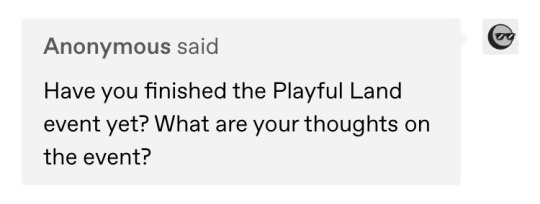
By “better”, I’m going to assume you mean which (between Glorious Masquerade and Stage in Playful Land) I preferred in each of those categories? (I say "preferred" here because I'm judging based on my own tastes; obviously everyone will have a different opinion on how the two events compare.)
It’s quite a few to get through, so I’ll just quickly summarize each. This post will also serve as my general thoughts on Stage in Playful Land.
***Spoilers for those two events below the cut!!***

NRC cast design — I’d say the designs are pretty split down the center?? In theory, I love the concept of masquerade balls and marionettes, but in practice the designs look all over the place and I really only like a select few of them.
NRC cast role — GloMasq was stronger in this, especially the choices for the SSR trio. Malleus and Idia are a deliberate rival and foil to Rollo, whereas Azul’s UM comes in clutch during the final showdown. Meanwhile in Playful Land only Kalim seemed to be very significant story-wise; he was the one trying to convince everyone to sit down, eat, and try to understand Fellow’s motives, is the last to be captured, and gives the big speech about how he’ll never abandon his friends + the importance of school. Ace has his usual schtick of being brutally honest and there are some parts where Ortho’s robotic abilities come in handy (like playing sounds to distract the puppets), but these seem like very minor roles compared to what the GloMasq trio did. Perhaps they were good choices for the end when they all decided to destroy the amusement park though??
I also feel like some things the SSR trio does in Playful Land (like dispersing the puppets by using a “lost item”) could have been done by any smart or deceptive character (Leona, Vil, Cater, etc.), not just the SSRs (ie Ace). Furthermore, the other cast members in GloMasq seem much more important in how they split off and battle—there are good reasons or synergy given as to why they pair up the way they did (ie Riddle and Epel needing to be good flyers, Ruggie and Jamil willing to use others as meat shields, etc), while in Playful Land it seems more random (like Floyd losing interest) or obligatory (mostly the third years stepping up to defend the younger students).
It’s also anticlimactic how Fellow just let them all go??? Especially compared to Malleus, Idia, and Azul and Rollo squaring off to the bitter end.
Yuu and Grim’s role — Once again, this goes to GloMasq. In Playful Land, Yuu is automatically caged and tossed into a corner to wait it out to the climax. At least in GloMasq Yuu is actually doing something (even if it is offscreen): they’re with Grim and Trein, helping the townspeople from the flowers. (Note: I’m not entertaining the “but Yuu is magicless! It was a wasted opportunity for them not to have a bigger role in GloMasq!” thing because I’m talking only about canon and not hypotheticals here.)
New character(s) — … Do you even need to ask 😭 Obviously, I’m loyal to Roro-chan Rollo; I just find his story and character to be super interesting, especially with the root of his conflict being inner turmoil and an inability to move on… It makes him an excellent foil to Idia.
While I do also enjoy Fellow and Gidel, I feel that I’m not as invested in them because despite the terrible dark shit they're doing, the conflict they get wrapped up in gets resolved in an underwhelming manner. Plus, there was not a lot of elaboration on their own backstories?? It was mostly told to us via Fellow, yet kept so vague that the fans are left to fill in many missing details on their own. I’ll have another post out later going into more depth with how I feel about Fellow and Gidel.
Movie-inspiration — I think both events have their moments of film inspiration. A lot of GloMasq's comes through in the traditions and culture of the city, whereas Playful Land's are embedded into the games, foods, rides, and attractions in the park itself. Playful Land feels more overt because of how flashy everything is, but also because it's not really based on any real-world area (unlike the City of Flowers/Fleur City, which is fantasy Paris and therefore also has Paris elements) it has to stand on its own. They don't need to worry about developing a unique "culture" for a smaller area like a park; they can just cut loose and have everything be fun and whimsical like Pleasure Island is. For this reason, I feel that Playful Land has stronger movie ties.
Side note: I want to put out the disclaimer that I personally don’t think how much an event references its source material should be counted when evaluating the quality of its writing. Just because you mention things from the film or reinterpret them doesn’t mean the story itself is good.
Music — I’m going to give this one to Glorious Masquerade because while the tracks are nice for both (I love the dramatic bells in GloMasq and the eerie music box of Playful Land, and both songs with lyrics are also great!). However, the narrative context and meaning behind the songs with lyrics are very different, and I feel that this makes Let My Wish Resound performance that much more meaningful. Additionally, Playful Land introduced a sung version of Rave Up! Up! in part 3 (even if it was just the first half of it) whereas GloMasq saved its sung version for part 5, which grants us more time to get hype. (I also like the rhythmic/twistune of the boys dancing over the boys… idk, dancing and doing property damage for funsies.)
Opening — Both openings do a good job at building up the hype for the ominous events to come, but again GloMasq wins on a technicality… which is the quality of the evil laughs given during them 💀 Fellow’s is kinda weak (like it stutters and sounds like he’s out of breath), at least Rollo can do a slow, unabashed laugh like a proper villain/j
Setting — This one’s suuuuper subjective; I don’t really like amusement parks I know, I’m boring so that automatically means I don’t find Playful Land to be a compelling or interesting setting (even if it fits thematically). I’d much rather just be allowed to wander and explore a city unsupervised, get to learn about its history and culture by experiencing it myself. GloMasq’s City of Flowers/Fleur City allows Twisted Wonderland to be expanded so much more (like, thinking about how this city relates to other cities and countries), whereas one isolated floating park doesn’t add much to the overall world lore.
Plot — Playful Land was so… boring 🤡 I’M SORRY, IT’S TRUE (to me)????? Like, they were just aimlessly wandering around during the second half of the event (even though it should be obvious that Fellow is at the theater)???? While at least in GloMasq they knew where to go (the bell tower) right away and strategized around that… Plus, we keep switching perspectives between the captured boys and the action, which bogs down the pacing. GloMasq keeps the action going and only takes very brief pauses to check in on our villain for the evening. There was way too much time spent meandering and not enough time spent actually Doing Things in Playful Land.
Stakes — GloMasq’s were higher. This isn’t to say that higher stakes automatically means the event itself is good. It’s just that the same urgency isn’t present in Playful Land because the scope of it is not as grand. If the crimson flowers/fire lotuses spread, there is no stopping them—and it endangers many people, communities, industries, etc. if they do. Meanwhile, a handful of people go missing in Playful Land. It’s still tragic, and their losses will still impact their loved ones—however, that’s still on a smaller scale than what the flowers would have done to their world.
Ending — GloMasq trumps. It’s just perfect how Rollo indicates he won’t give up and then drops ominous lines foreshadowing Malleus bringing ruin to them all (ie book 7) 😂 Love the pettiness of the banter, the ballroom setting, the perfectly timed delivery of the gift/song, and especially how Rollo’s punishment was so perfectly fitting for someone as neurotic and self-righteous as he is!! Also loved little details like the gargoyle and Trein wanting to keep an eye on Rollo 💕
The conflict resolution for Playful Land felt like a deus ex machina…? Fellow’s literally about to win (he caught them all) and the boys get let off the hook because Fellow had a change of heart. The boss told him it will cost a lot to repair the destroyed puppets so it’s coming out of his paycheck… That, and I guess all the stuff the boys were saying about how great school is finally got to him? Fellow got so fed up he called the whole thing off???? So he releases everyone and they all go around busting up the park???? I mean, they did foreshadow it by pointing out earlier how Fellow isn’t loyal to his boss + showing more phone calls where the boss is getting increasingly annoyed 💦 so it’s not as anticlimactic as Endless Halloween Night (one of my least liked events). I just mainly dislike how the conflict is triggered in part by Fellow’s boss being rude 😭 Like damn, what if his final straw hadn’t been claimed??? Then everyone is screwed.
At the very end, Fellow and Gidel decide to go on the run?? Which… isn’t an easy thing to do but it’s hand waved away so fast. If the staff meant for it to feel this way because the original Pinocchio also left Honest John and Gideon’s fates ambiguous and they did show remorse for their victims 💦 idk, it’s cases like this that make me think TWST is at its best when it does more of its own thing rather than strongly stick to the source material…
I also have?? Mixed thoughts on how TWST doesn’t follow up on the whole “yeah a bunch of rich people are caught up in running a human trafficking operation using this scary ass magic”. I know crime must exist in TWST, so in a sense this is… realistic??? But it feels odd to see such a big thing being casually mentioned and not being treated with full gravity?? (Maybe these are the types of crimes that special mage police defense forces (like the one Deuce wants to join) investigate??) Guess that’s just going to sit in the back of our heads from now on… It’s not satisfying seeing a story “end” like this, but I understand why it had to be 😭
The cathartic release of breaking down the park that once trapped them all is fun, but too goofy. I know it symbolizes a lot more than that, but it’s just not for me.
And so (to no one's surprise, given the frequency with which I talk about R*llo), I much prefer Glorious Masquerade to Stage in Playful Land. It's not even a contest to me. A certain pseudo-French boy aside, I just think the former has much better writing overall. By comparison, Stage in Playful Land has a very strong aesthetic and start, but not much else to keep me engaged??? It was an entertaining if not mid event aside from the big scare when the twist is initially revealed (because none of us expected it to be that dark) and minor other parts like Kalim’s big speech. The rest of the event felt like walking around and not doing anything useful.
I honestly think the failure of Playful Land to execute on its ideas comes in part from the hype of Halloween events (like, so much attention is put onto them that when Halloween events flop, it is SUPER noticeable) and the legacy of GloMasq (which set the bar VERY high) 💦 A shame, really…
Anyway, round of applause for Roro, who stays winnin’--
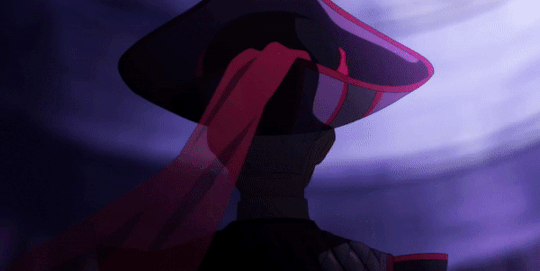
#twisted wonderland#twst#Rollo Flamme#Malleus Draconia#Idia Shroud#Ortho Shroud#Kalim Al-Asim#Ace Trappola#Fellow Honest#Gidel#Gidell#Ferro Honest#Azul Ashengrotto#disney twisted wonderland#spoilers#notes from the writing raven#question#Yuu#Grim#Mozus Trein#Riddle Rosehearts#Jamil Viper#Scarabia#Ignihyde#Ruggie Bucchi#Epel Felmier#Leona Kingscholar#Cater Diamond#Vil Schoenheit#tw // human trafficking
141 notes
·
View notes